
IN WHOSE SERVICE?
A sharp divide exists on a ballot initiative that would mandate raises for all tipped workers in the state. Both sides agree, however, that the impact could be profound. Page 2
Change service requested


A sharp divide exists on a ballot initiative that would mandate raises for all tipped workers in the state. Both sides agree, however, that the impact could be profound. Page 2
Change service requested
Why does it take so long to get a liquor license?
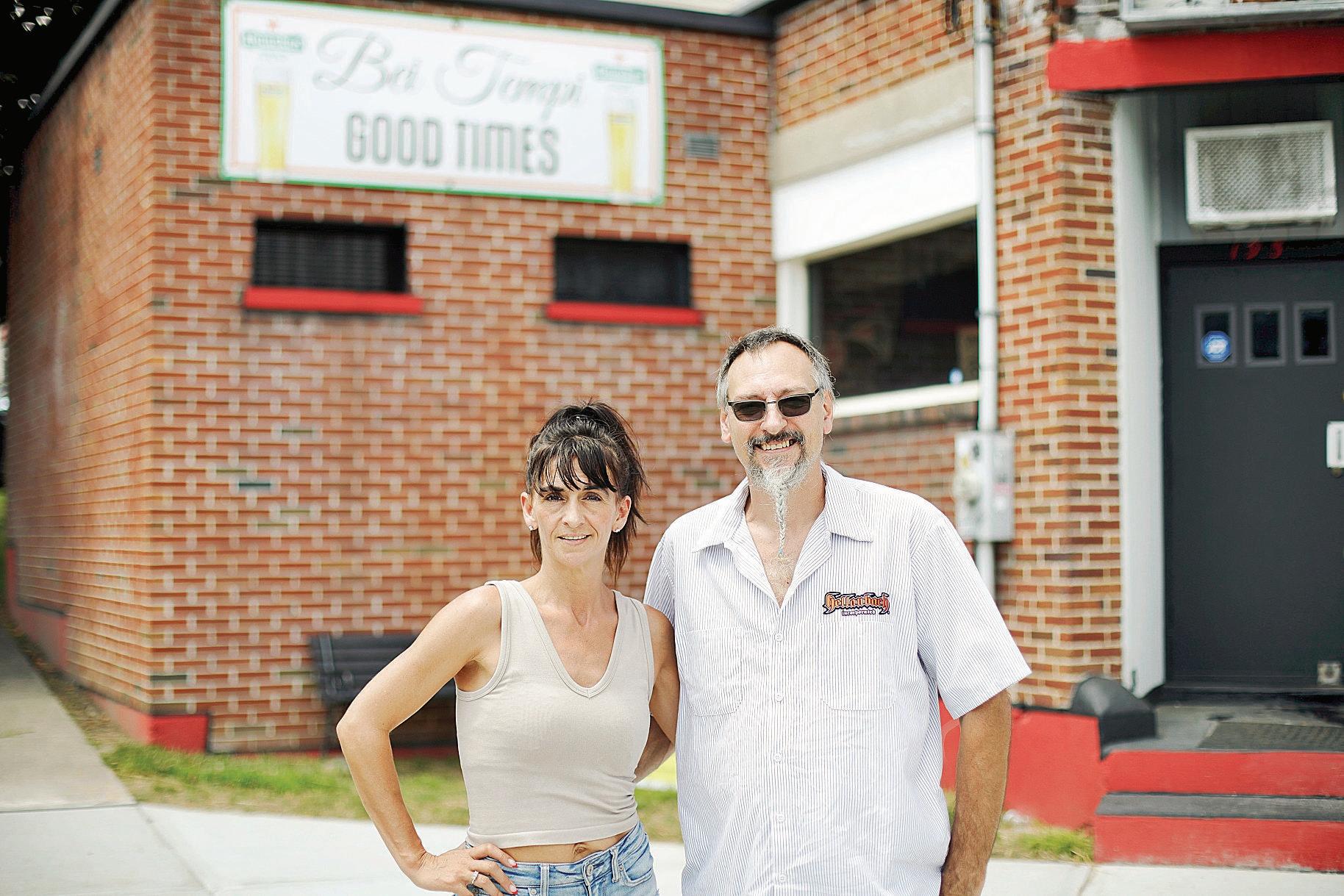
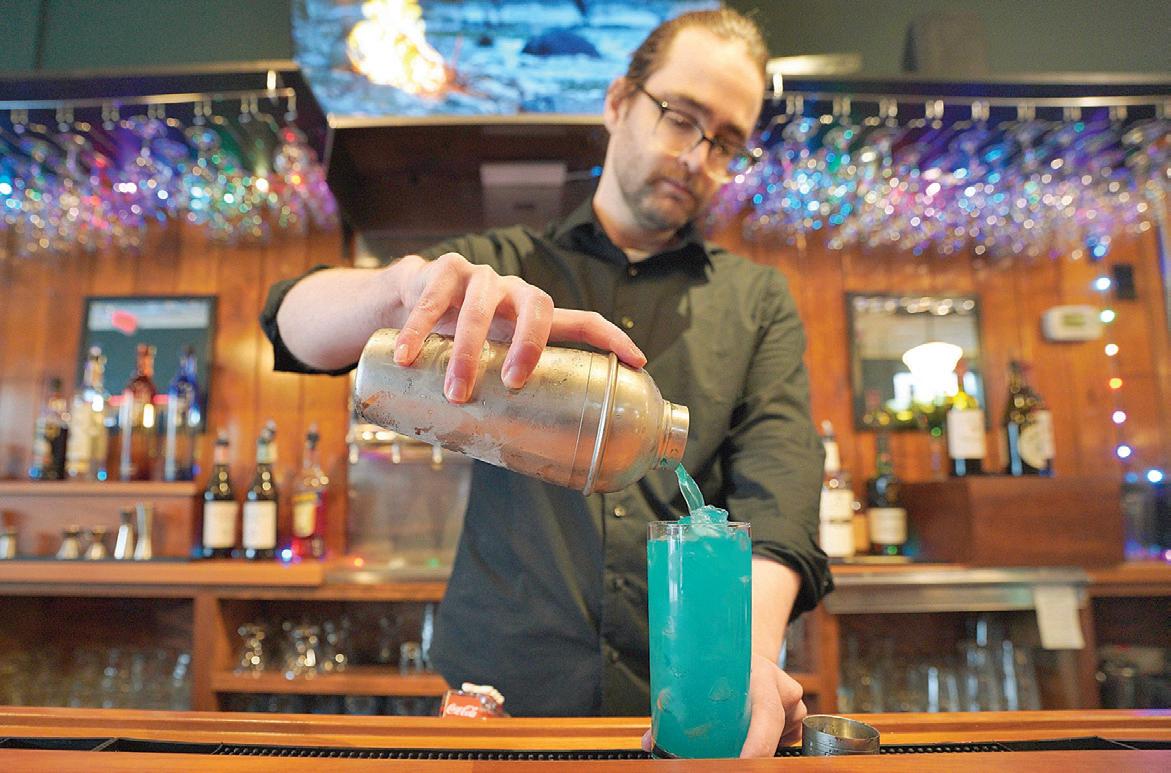
By ElliE Davis anD Matt MartinEz
PITTSFIELD — Elizabeth Zucco knows the trick to running a successful restaurant business, regardless of menu or location: liquor sales.
“The property is what you make it, but I know alcohol is profitable,” Zucco said. “That’s what really paid our bills for the last 20 years.”
For the past 22 years, Elizabeth Zucco has been the co-owner of Zucco’s Restaurant on Dalton Avenue with her husband, Richard. Together, the couple just opened a new bar, Bei Tempi, in what used to be the Crossroads Cafe at 195 Onota St.
Alcohol sales are so integral to the Zuccos’ business that when they encountered obstacles obtaining the liquor license for Bei
Tempi, they delayed opening.
It took Zucco less than five minutes to get approval for a license transfer from the Pittsfield Licensing Board in April 2023 — and over a year to get final approval from the state Alcoholic Beverages Control Commission, or ABCC, due to a discrepancy with the previous owner of the building and license.
The Zuccos are among the latest Pittsfield business owners to get caught in a back-andforth with the ABCC over a liquor license transfer. Other area restaurants have operated their first few months dry because of complications. Issues with paperwork, immigration status and more can hamstring an applicant.
It’s a statewide issue, a bureaucratic web of regulations, in a
state that didn’t allow alcohol to be sold in package stores on Sundays until 2004 and where happy hours are still banned.
But in Pittsfield, the problem is more stark: No new liquor licenses can be created by the city; there are none to give.
Roughly 40 years ago, municipalities in Massachusetts had the opportunity to take a one-time deal with the state to have no limit on liquor licenses, according to the ABCC. Great Barrington, Lee, Lenox, North Adams and Williamstown took this deal, but Pittsfield did not.
This means hopeful applicants in Pittsfield must purchase transfers from former businesses owners, which makes it more likely the process will get held up by unresolved issues from the
By Jim T herrien
PITTSFIELD — Advocates and op -
ponents of Question 5 agree on one thing — if the ballot initiative passes in November, it will greatly impact the restaurant/bar industry and tipped employees.
The initiative — sponsored by the advocacy group One Fair Wage — seeks to raise the minimum hourly wage for tipped workers until it equals that of all Massachusetts workers.
Tipped employees would see their minimum rate rise over five years from the current $6.75 per hour to 100 percent of the state’s minimum wage for all workers, currently $15 per hour.
The Massachusetts Restaurant Association contends that passage of the question would lead to lower wages for servers and others receiving tips, most of whom the association says are earning far more than minimum wage now.
“It will take money out of the pocket of the servers, and it will increase costs for restaurant owners,” said Steve Clark, president and CEO of the restaurant association.
However, One Fair Wage advocates argue that only servers receiving the highest salaries in high-end downtown or resort establishments might see reduced tips, but they would still make excellent wages.


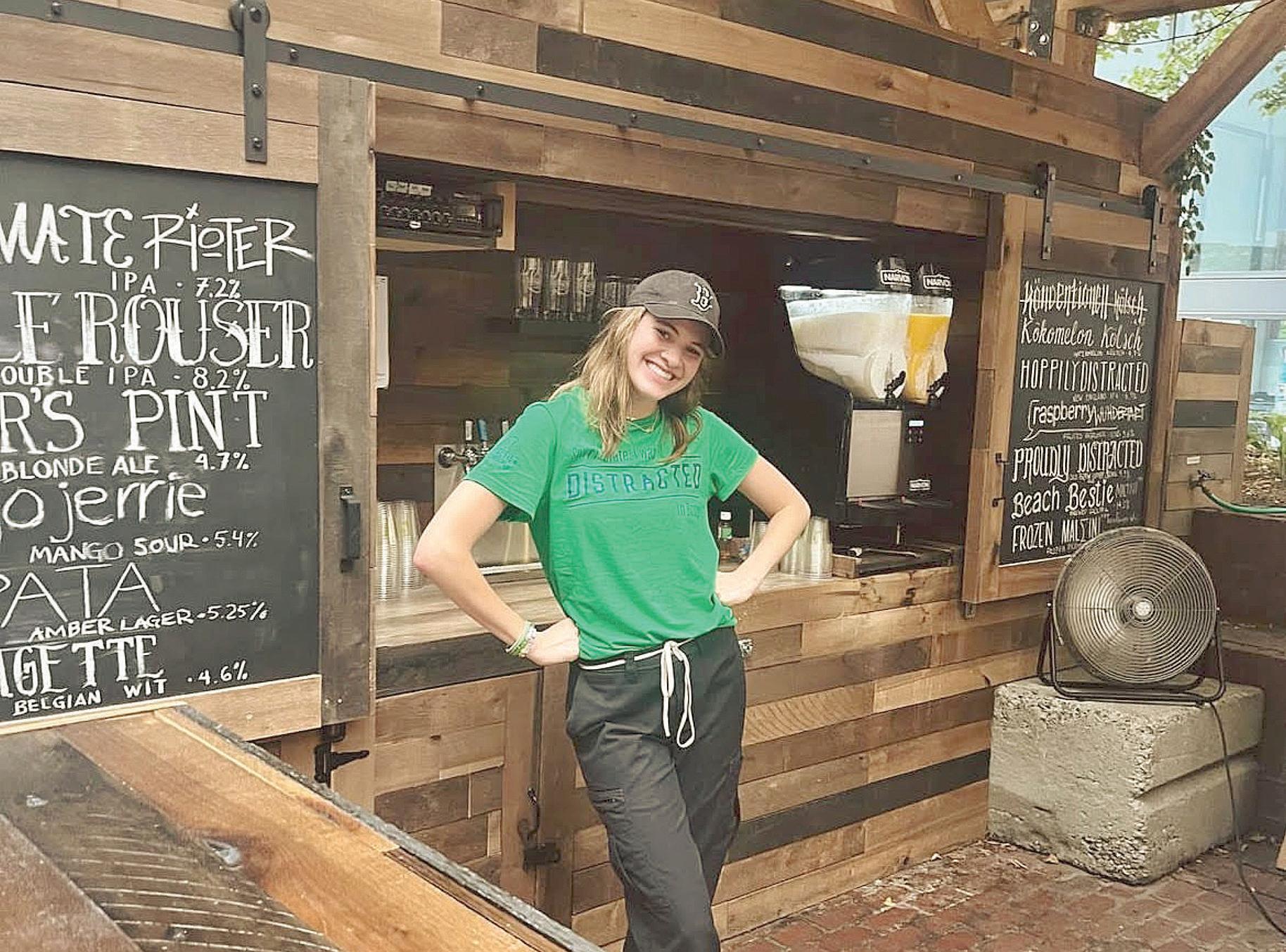
“This is for the everyday working-class folks; this is for the people who aren’t making enough right now,” said Grace McGovern, lead Massachusetts organizer for One Fair Wage.
“This might bring down a little the high-wage bartenders in
downtown Boston or those who can afford to live on Nantucket for the summer and are pulling down $100,000 or more a year,” McGovern said.
But the advocacy group says the great majority of tipped workers around the state would
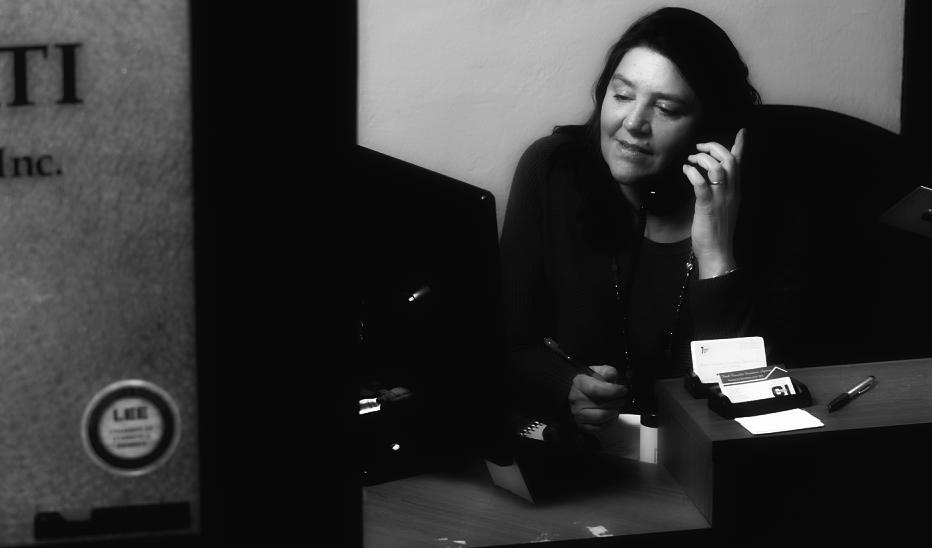

benefit from elimination of the low-tipped worker minimum wage, and the industry as a whole would see reduced employee turnover and higher job satisfaction among workers.
One Fair Wage estimates that 240,000 people work in the indus-

Steve Clark, president and CEO of the Massachusetts Restaurant Association, says passage of Question 5 would lead to lower wages for servers and others receiving tips, most of whom the association says are earning far more than minimum wage now. “It will take money out of the pocket of the servers, and it will increase costs for restaurant owners,” he said.
try in the state, and a high percentage are people of color, and a majority are women. Many tipped workers, the group says, work in more casual restaurants or bars where tips are typically much lower.
‘IMPLEMENTATION COSTS’ Clark of the MRA said there are some stark reasons for


voters to reject Question 5.
Implementation costs, he said, would be about $18,000 per employee, “so that will naturally increase costs for consumers. So your servers, your owners, your consumers don’t want it.”
After similar tip wage provisions were implemented in Washington, D.C., he said, “an estimated 3,000 jobs were lost, and probably every restaurant has implemented a service charge to offset the cost of this.”
However, McGovern said the industry already is shouldering a “huge cost” related to constant employee turnover and low job satisfaction, wherever employers can offer a sub-minimum wage and employees must rely on tips to supplement their salary.
“Restaurants are doing better in states that have this,” she said, adding, “This is one way to combat [turnover].”
McGovern said the ballot initiative would allow restaurant servers and those in similar occupations to receive the state’s normal minimum wage of $15 an hour and add whatever else they receive in tips.
If it passes, the initiative would raise the tipped workers minimum in stages through 2029 to 100 percent of the minimum for all workers.
But Massachusetts law already requires employers to make up the difference between the tipped workers minimum wage — $6.75 an hour — and $15 an hour, the state’s minimum for all workers, Clark said.
“Currently, every server is guaranteed $15 per hour; that is a state and federal law,” he said, arguing that an effective system already is in place.
“There are severe penalties if that doesn’t happen,” he said. “Servers make far more than minimum wage — they are making $30, $40, $50 an hour. They don’t consider themselves minimum wage em-

This proposed law would gradually increase the minimum hourly wage an employer must pay a tipped worker, over the course of five years, on the following schedule:
• To 64 percent of the state minimum wage on Jan. 1, 2025;
• To 73 percent of the state minimum wage on Jan. 1, 2026;
• To 82 percent of the state minimum wage on Jan. 1, 2027;
• To 91 percent of the state minimum wage on Jan. 1, 2028; and
• To 100 percent of the state minimum wage on Jan. 1, 2029.
ployees; they don’t want to be minimum wage employees.”
Clark added, “This [Question 5] changes the entire model in the full-service restaurant — they have to pay servers the full minimum wage and then you could share their tips with any employee that you wanted.
“I think the system is not broken, and the servers are the ones who are saying the current system works,” he said. “So I don’t think it needs to be change. It’s a solution in search of a problem.”
The ballot initiative also would allow — though doesn’t mandate — implementing a more structured format for tip-sharing between front-line servers and back-ofhouse restaurant/bar workers.
All employees would first have to be at minimum wage with tips to be added on top.
ONE FAIR WAGE
McGovern, who has worked as a tipped employee in a brew pub, said the arguments of opponents of Question 5 leave out important considerations.
“The way it benefits us is that now you have a steady, consistent wage to count


on,” she said. “So you are earning minimum wage plus tips on top. You no longer have to rely on tips for that base wage. And now you can be rewarded for good service, and your tips will come in the form of an actual tip on top of your hourly rate, rather than going toward making sure you make that full $15 an hour. It will actually be a gratuity.”
She added, “I think the biggest thing is the consistency of pay, and you can rely on that, no matter if it’s a slow season, slow shift or whatever it may be.”
With rates of employee turnover typically high in the industry, she said, elimination of the sub-minimum rate option for businesses encourages workers to stay, learn and grow in their jobs, “and that helps the employers as well.”
As a tip worker, McGovern said she believes employers generally comply with the legal requirement to add to the tips rate of $6.75 per hour when needed to make the employee’s pay rate equal $15.
But she adds, “Basically, in the system as it is now, customers are subsidizing the [tipped worker] wages for employers,” and tips for workers are now “going toward the employer not
having to pay [$15 per hour].”
Max Dolan, managing partner of Bistro Zinc in Lenox, said, “Generally speaking, we are not for it. From a business standpoint, running a restaurant, surviving in this business, is pretty difficult. I think everybody in Berkshire County has seen restaurants come and go, and after the pandemic it’s not easy.”
He added, “If you raise the minimum wage for servers it is going to cut into those margins. I really don’t see how a business that is kind of struggling to get through is going to be able to survive without passing that on to the customer.”
Whitney Asher, owner of Brava and Ombra, and also president of the board of the Lenox Chamber of Commerce, said he believes he will vote no on the question.
“I understand increasing minimum wages,” he said, “but I don’t think the current system is broken. I already pay most of my employees (tipped and not tipped) more than the minimum wage.”
He added, “To clarify, all my tipped employees make good tips. Bartenders and







servers I pay $6.75 to start and then some get $9, some get $12, some get $15. I also pay $18 or $19 to runners and hosts who get a small cut of the pooled tips.”
WHO IS WINNING?
Asked about polling or public sentiment on Question 5, Clark said, “Things are going well. We have a servers’ poll on how they feel about this, and 86 percent think the current system works for them. Eighty-eight percent don’t want to get into a situation where the tips are pooled with non-service people, and 80 percent said they think if tips were eliminated they would earn less.”
McGovern said One Fair Wage is skeptical of the industry association’s polling. During the signature-gathering phase for Question 5, she said the great majority of people encountered wanted to sign the initiative petition — especially those who have worked in the server industry.
“A lot of people who have worked in the industry were very sympathetic,” she said. “Some just grabbed the clipboard and said, ‘I’ll sign.’”
Many who never worked in the industry were surprised how low the tipped minimum wage is, she said, adding, “For the most part, [the initiative] was extremely easy to pitch.”
One Fair Wage Massachusetts collected more than 100,000 signatures since last fall to place the initiative on the Nov. 5 election ballot.
As a multistate organization, McGovern said, “Our primary purpose is to end subminimum wages. In order to do that, we are tackling it state by state. And hopefully, when we get enough states, then we will be able to get something on the federal level.”
McGovern said that seven states plus Chicago and Washington, D.C., do not allow employers a sub-minimum wage option, adding that research by One
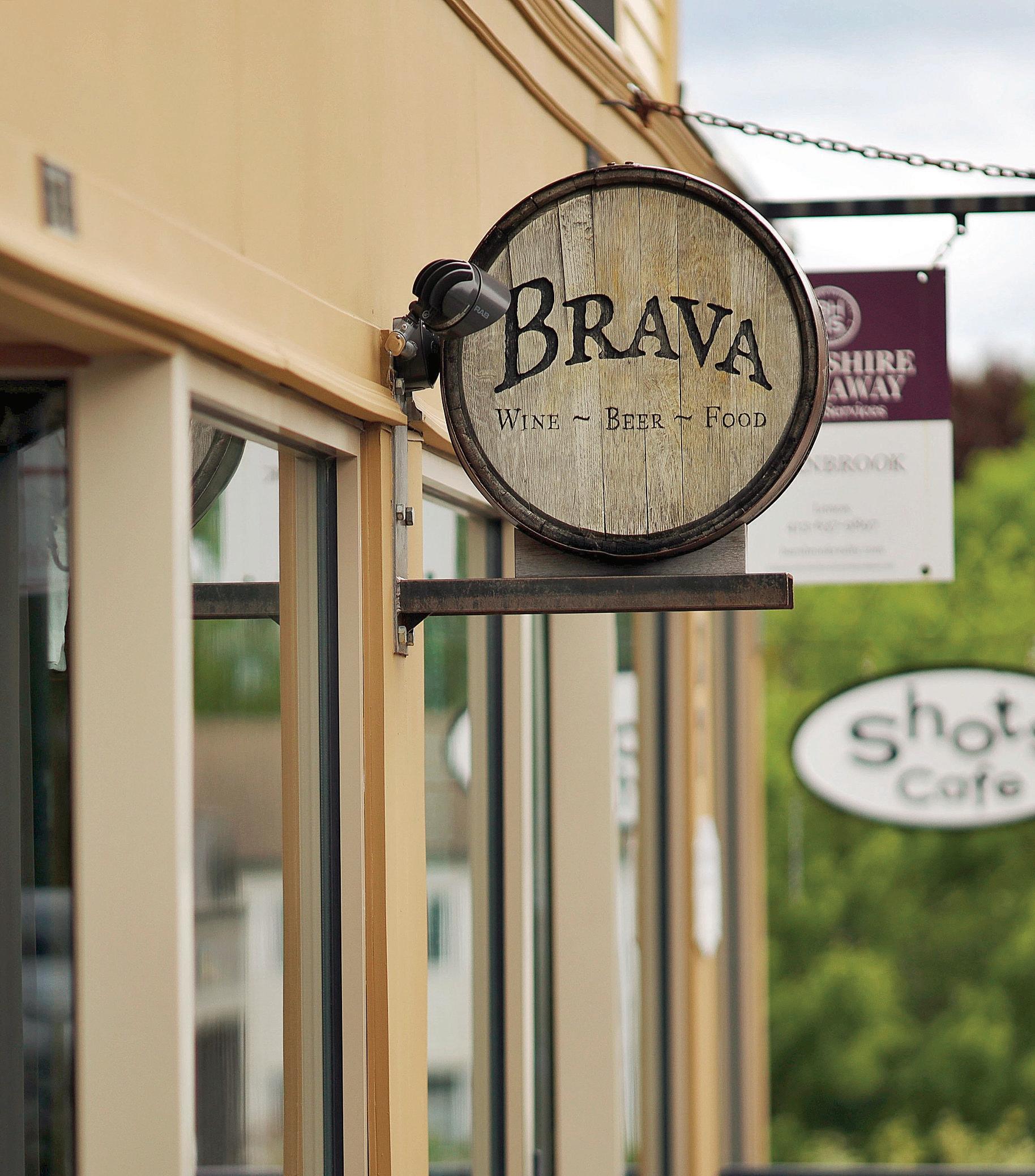
Fair Wage found the industry is thriving in those places when compared to other states.
“Actually, the restaurant industries have been doing a lot better there,” she said, “and the rates of poverty in those states are about half the rates of poverty in the restaurant industry compared to Massachusetts.”

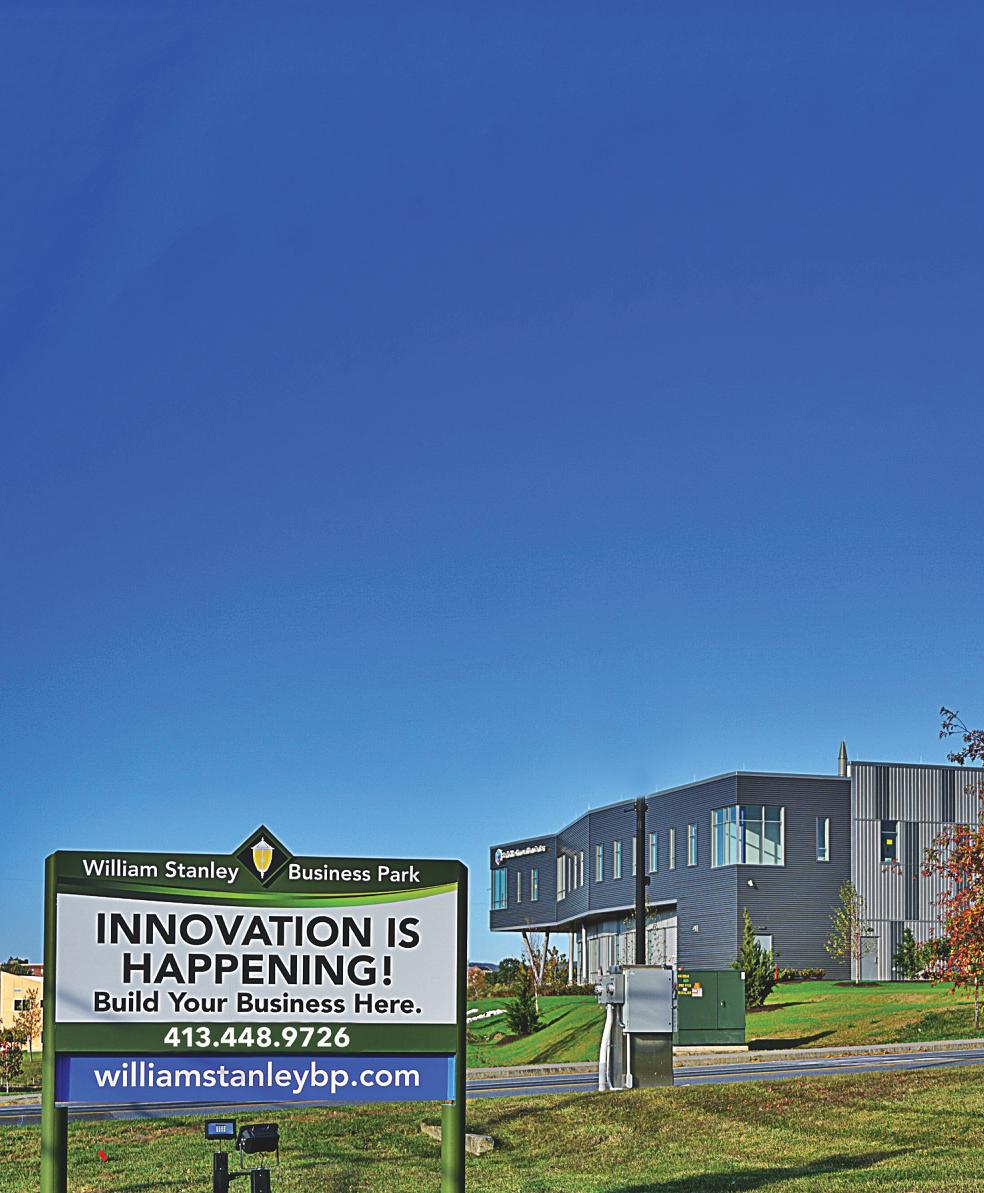

The states she cited are Minnesota, California, Washington, Oregon, Nevada, Montana and Alaska. McGovern said those states have had average rates of growth in the industry much higher than in other states.
Some of the states never had a sub-min-
imum wage, and other states, like California, passed legislation to eliminate that practice, she said.
State Rep. Tricia Farley-Bouvier, D-Pittsfield, who was one of the early supporters of legislation to eliminate the two-tiered minimum wage system here, agreed with that assessment.
“When you look at the states that have one fair wage, and do not have a two-tier system, they have thriving restaurant industries, and servers are still getting tips and make a good living,” she said. “So it is not hurting the servers.”
To her, another very important aspect of the issue, “is that it’s very clear through studies that states that have one fair wage have a much lower rate of sexual harassment.”
Clark countered, “I am not sure what metric they use to define ‘better.’”
He said, “Restaurants are closing every day in California. Restaurants in Washington are implementing service charges.”
In addition, he said, “According to a Toast analysis, California — the model for this question — consistently has the lowest tip average among all 50 states.”
In Massachusetts, bills have been proposed to eliminate subminimum wage rates but have not been enacted.
Farley-Bouvier said recently that she would prefer to enact a bill to end the twotiered minimum wage system.
She said she has not been involved in the ballot initiative, adding, “I’ve been focusing on the legislation, but I will be voting for the One Fair Wage.
“I filed the bill several years ago because I believe that people should receive a liveable wage,” Farley-Bouvier said. “And the more I learn about the tip minimum wage, how it is truly based in racism — that it goes back to the days of the post-Civil War — I see that it is not just.”
She added, “While some make quite a bit of money in tips, there is a very large disparity between those who make large tips and those who don’t, and often you can see the thread of a color line there.”


PITTSFIELD
Elder Services offices move to new location
Elder Services of Berkshire County has relocated its administrative offices to a central location in the heart of Pittsfield.
The new space at 73 South Church St., previously occupied by Wayfair’s open-concept call center, underwent significant renovations on the first and second floors to construct offices and other spaces for Elder Services’ growing workforce.
The new location offers ground level access, an enhancement for clients and visitors with health and mobility issues as the agency’s former space required a journey to the fourth floor to access services.
“Our staff are excited to have moved into bright, contemporary space in the heart of Pittsfield,” said Executive Director Christopher McLaughlin in a prepared statement. “Our new offices enable easier access for our clients and enough space for our workforce, which continues to grow in response to unprecedented demand for the services we provide.”
The agency is also celebrating its Golden Anniversary. Elder Services was incorporated in 1974 as a private, nonprofit home care corporation with three staff. What was once an agency focused solely on home care support has grown to offer an extensive list of services including home care, information and referral, caregiver support, SHINE counseling, housing options, long-term care ombudsman advocacy, money management, and the Meals on Wheels senior nutrition program.
To commemorate its anniversary, Elder Services is conducting a $50 for 50 Years campaign. Visit esbci.org to make a donation. All donations support the agency’s mission and help aging individuals remain independent in the homes of their choice.
PITTSFIELD
Greylock Federal
marks Youth Week
Greylock Federal Credit Union celebrated Youth Week 2024 earlier this month with a kick-off event at its Community Empowerment Center and weeklong festivities throughout all of its branches.
This year’s theme, the “Amazing Savings Race,” featured a map that included key financial wellness stops, including the benefits of a savings or checking account, the 50-30-20 rule, and the power of compound interest, among other things, during the week of events beginning Aug. 5.
Outside in the parking lot, guests enjoyed face painting, sand art activities, and games. Krispy Cones was on hand serving hot dogs and hamburgers and Operation Copsicle, led by the Pittsfield Police Department, shared refreshing treats.
“We recognize and understand that financial wellness isn’t a one-and-done concept, but rather, a way of life that involves individuals of all ages,” said Roberta McCulloch-Dews, vice president of marketing, in a recent news release. “That’s why we were especially thrilled to welcome more than 170 young people and their families to our Youth Week 2024 event on Aug. 5.”
Throughout the week, new and existing Greylock youth members, 17 and under, had an opportunity to meet with branch staff to perform transactions noted on their Amazing Savings Race map, enjoy free giveaways, enter a raffle for an Amazon Fire tablet (one winner per branch), and sign up for a new Youth Club CD special, available for that week only.
GREAT BARRINGTON
Donation to help raise
$15K for mobile market
Berkshire Grown will raise up to $15,000 for the Berkshire Mobile Farmers Market by matching gifts to the
market up to $7,500 thanks to a recent donation in honor of National Farmers Market Week.
The Berkshire Mobile Farmers Market, a collaboration of six local nonprofit organizations, brings fresh, locally grown and produced food to six communities with limited access to fresh food: Adams, Becket, Monterey, North Adams, and two Pittsfield sites.
The market operates on the tiered Fairshare Payment system, which allows shoppers to pay at the level that works for them, based on their current financial situation, either 100 percent of retail, 50 percent of retail, or free.
Berkshire Grown is a local nonprofit organization based in Great Barrington. To support this project and help make farm-fresh, local food available to all Berkshire residents, visit berkshiregrown.org.
PITTSFIELD
MassSave incentives on natural gas to end
Berkshire Gas Co. has announced it will discontinue issuing rebates, incentives and financing through the Mass Save Energy Efficiency Program for equipment powered by natural gas.
In a statement from parent company Avangrid Inc., Berkshire Gas said as of Aug. 31, residential customers will no longer qualify for rebates when purchasing high-efficiency natural gas boilers, furnaces and water heaters, though this change will not impact income-eligible customers. It cited “state regulatory decisions” for the shift.
Customers who are currently purchasing or planning to replace their natural gas equipment must complete installations by Aug. 31 to be eligible for applicable rebates, it said. All necessary documentation must be submitted to Mass Save no later than Sept. 30.
Beginning Jan. 1, Berkshire Gas will no longer be allowed to support spending on incentives, programs or support for systems, equipment, workforce development or training as they relate to new carbon-emitting equipment unless such spending is for low-income households, emergency facilities, hospitals, a backup thermal energy source for a heat pump, or “hard-to-electrify” uses, such as industrial processes.
The company said it remains committed to promoting energy efficiency through various measures including insulation, air sealing, barrier mitigation, Wi-Fi or Smart thermostats, aerators and process improvement.
For more information on available weatherization programs and other energy efficiency initiatives, visit masssave.com.
Fairview Hospital has been twice recognized for its stroke care by the Paul Coverdell National Acute Stroke Program of the Massachusetts Department of Public Health.
In a statement, parent company Berkshire Health Systems said the hospital was honored for “Achieving Door to CT Less Than or Equal to 25 Minutes From Arrival for at Least 85 percent of Stroke Patients” and “Dysphagia Screening Greater Than or Equal to 90 percent.”
The program is a Centers for Disease Control and Prevention funded quality improvement collaborative administered by DPH that supports primary stroke service hospitals.
The door-to-CT measure demonstrates the percentage of stroke patients receiving a CT scan in less than or equal to 25 minutes from the time of arrival at the emergency department. For the award, the measure includes all eligible stroke patients who arrived at the hospital by EMS and within 4 1/2 hours. Hospitals are encouraged to include EMS agencies in quality improvement activities aimed at improving this measure.
The dysphagia award recognizes
hospitals that completed dysphagia screening on at least 90 percent of stroke patients from January to December 2023. The screening measure captures the percentage of stroke patients who undergo screening for dysphagia with an evidence-based bedside testing protocol approved by the hospital before being given any food, fluids or medication by mouth.
For information about the programs and the signs and symptoms of stroke, visit mass.gov/dph/heartstroke.
PITTSFIELD
Berkshire County Arc raised $45,000 at its 29th annual Golf Classic held this summer at Berkshire Hills Country Club.
The funds raised from the event go directly to individuals with disabilities for activities such as art classes, medical equipment, wheelchair swings, concerts, assistive technology, and dream trips to places like Disney, Celtics games and deep-sea fishing.
The money also goes to scholarships to area high school students planning to pursue human service careers.
The lead supporters of the event this year were Berkshire Bank, Health New England, Greylock Federal Credit Union, The Notch Insurance Group, Synagex Modern IT and Advance Manufacturing.
BCArc serves around 1,000 individuals with disabilities through a range of programs that include residential services, employment support, day programs and support for families at their homes.
PITTSFIELD
The Berkshire Community Pharmacy at Berkshire Medical Center has achieved accreditation for the quality of its specialty pharmacy services.
The Accreditation Commission for Health Care noted that the pharmacy, located in the Warriner Building at BMC, “has demonstrated that it operates at a level of quality, integrity and effectiveness consistent with ACHC standards. It is an achievement of which your organization can be proud that marks your commitment to quality in the provision of care.”
“This accreditation shows that the Berkshire Community Pharmacy provides an exceptional standard of care for our patients,” said David MacHaffie, director of retail and Specialty Pharmacy Services for Berkshire Health Systems. “Our Specialty Pharmacy is critical for many of our patients with complex medical conditions who require specialized pharmaceutical services. This recognition is a credit to our entire staff for their continuous commitment to quality.”
The ACHC accreditation is effective for a three-year period. The Berkshire Community Pharmacy is also accredited by the Utilization Review Accreditation Commission.
LEE
Canna Provisions, a legal recreational cannabis dispensary, has earned its fourth consecutive win as the Best Cannabis Dispensary (Recreational) in the 2024 Chronogrammies Readers’ Choice Awards, presented by Chronogram Magazine.
Chronogram Magazine serves the Berkshires, Upstate New York and the Hudson Valley. The awards recognize the best local businesses and services as voted by the magazine’s readers.
Over 25,000 people participated in this year’s Chronogrammies Readers’ Choice Awards, resulting in readers voting Canna Provisions Best Dispensary (Recreational) for Massachusetts. Canna Provisions is a woman-led Em-
ployee Stock Ownership Plan (ESOP) company headquartered in Lee with a store in Holyoke and a craft cultivation in Sheffield where authentic Chemdog genetics and Smash Hits cannabis is grown exclusively for Canna Provisions.
SPRINGFIELD
Berkshire students earn stipends, scholarship
Several Berkshire County students are among the winners of tool stipends and a member scholarship from the Home Builders Foundation, the charitable arm of the Home Builders & Remodelers Association of Western Massachusetts of Springfield.
Wahconah Regional High School graduate Beau Walton, grandson of Wayne Walton of LP Adams, is one of eight students to be awarded a $1,000 scholarship. Member scholarships are available to members of the Home Builders Association, their family members, their employees, and the families of employees. Four local students are among nine trade school graduates to be awarded $750 tool stipends. The recipients include Jeffrey LeProvost from Lee High School, Aidan Lind from Taconic High School, Hannah Boisvert from McCann Technical High School, and Joseph Sanchez from Pittsfield High School.
Guidance counselors from vocational and trade schools in the Hampden, Hampshire, Franklin, and Berkshire County areas nominate their top senior candidates for this prestigious annual award. The association collaborates with each student to purchase tools tailored to their chosen career path in their respective trades.

A free monthly publication by The Berkshire Eagle 75 South Church Street Pittsfield, MA 01201 Visit berkshirebusinessjournal.com for advertising information and to subscribe NEWS DEPARTMENT 413-447-7311 news@berkshireeagle com
ADVERTISING DEPARTMENT AMY FILIAULT, Advertising Manager 413-496-6322 afiliault@berkshireeagle com
CHERYL GAJEWSKI, Director of Advertising Sales 413-841-6789 413-496-6330 cmcclusky@berkshireeagle com
Share your news with the Berkshire Business Journal. If you have a company promotion, a new business or a new venture let the Berkshires know about it Remember the 5 Ws and that briefer is better Email text and photos to BBJ@newenglandnewspapers com. Provide your expertise in the Berkshire Business Journal. Do you have the answer to a persistent question about business and the Berkshires? Do you have ideas and suggestions on how our business community can grow? If you have a comment to make about doing business in the Berkshires or if you re looking to raise an issue with the business community, this is the venue for that We welcome letters up to 300 words and commentary up to 600 words Send these to BBJ@newenglandnewspapers com
Berkshire Business Journal is
By Elli E Davis
ADAMS — Haddad Auto Group has purchased the two remaining GMC dealerships in Berkshire County and, at the direction of the automaker, will operate only one of those locations while offering the employees of both businesses jobs within the organization.
In the transaction, made official last month, Haddad Auto Group purchased McAndrews King GMC in Adams and Berkshire GMC in Sheffield.
McAndrews-King GMC, now Haddad GMC, will stay open with all of its employees. Berkshire GMC in Sheffield has closed its doors, and its nine employees have switched to jobs at either one of Haddad’s four franchise locations in Berkshire County or other dealerships and repair shops.
“It was part of the agreement with GMC that I buy both [dealerships] because they only want to have one dealership in the county,” President and CEO of Haddad Auto Group George Haddad said.
To Haddad, adding domestically-manufactured GMC vehicles to his existing portfolio of all foreign-made brands — Hyundai, Subaru and Toyota — makes sense. GMC makes heavier duty trucks than his current franchises, which Haddad says are in demand.
“We’ve got a lot of customers who want those, so it’s a natural fit,” he said.
Haddad chose to keep the northern location open over the southern location because it has more space and a full showroom.
“General Motors was fine with staying here because it was a full dealership,” he said. “The one in Sheffield, they [were] working out of a trailer.”
For Berkshire GMC, the decision to sell came at a time its owner, Brian Palmer, had decided to retire from the business, while McAndrews-King President Dan Maloney saw a sale as a way to keep the dealership open under new ownership.
Haddad, Maloney, and Palmer signed the deal on July 31 and Maloney started answering the phone with “Haddad GMC” yesterday.
After 50 years answering the phone as “McAndrews-King,” the change will
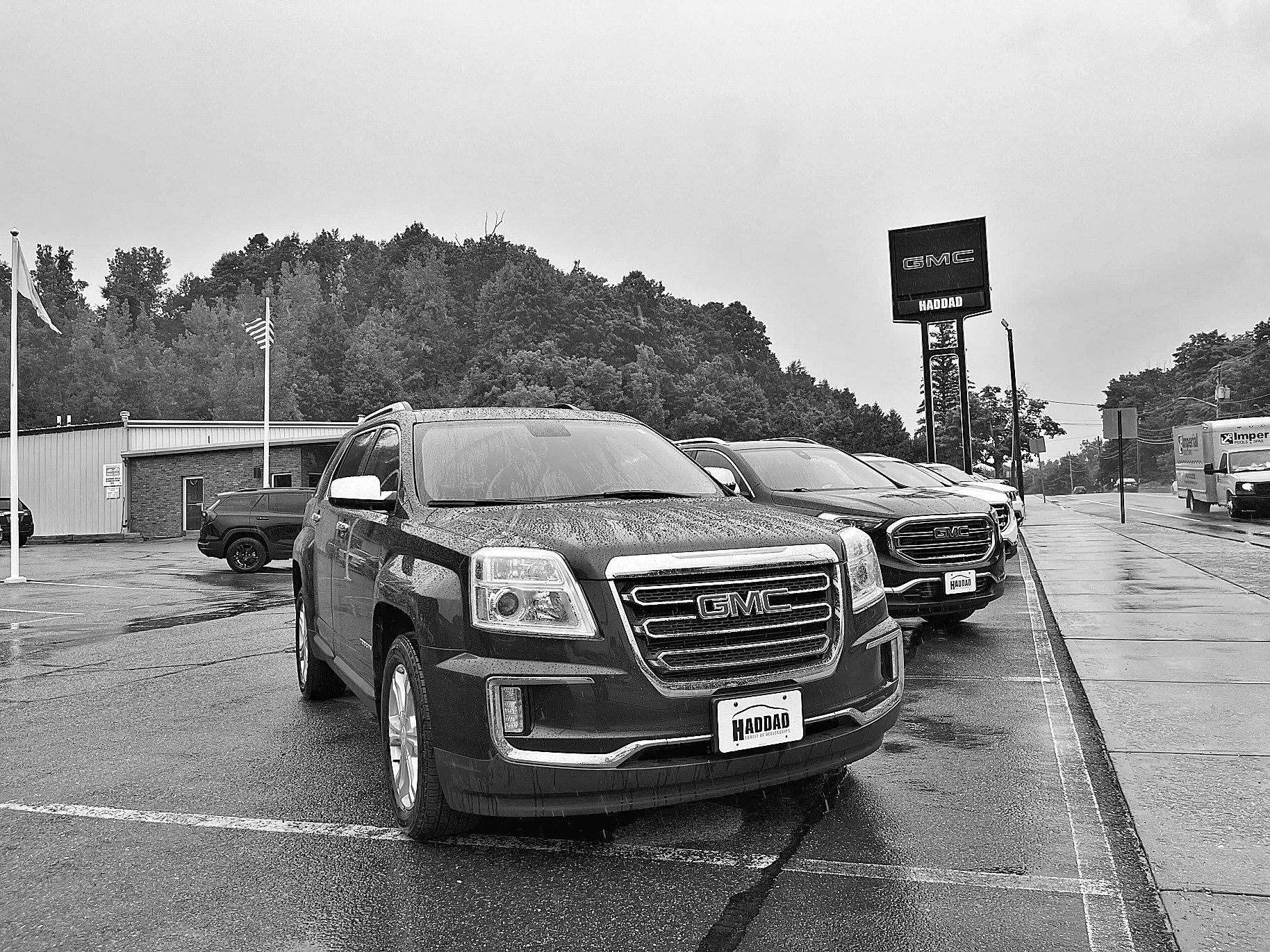
The former McAndrews-King GMC dealership in Adams has been purchased by Haddad Auto Group and is now operating as Haddad GMC. The company also purchased Berkshire GMC in Sheffield, and opted to close that dealership and offer its employees jobs within the organization.
be hard to get used to, Maloney said. But he felt comfortable moving forward with the deal.
“The more time I spent with George Haddad, it started to seem like a comfortable fit for everyone,” Maloney said.
Berkshire GMC in Sheffield’s nine employees have switched to jobs at either one of Haddad’s four franchise locations in Berkshire County or other dealerships and repair shops.
Haddad said that his company offered employment at Haddad franchises to “pretty much everyone” who worked at Berkshire GMC. “Some of them took it and some of them didn’t,” he said.
Brian Palmer took over the franchise from his father in 1996, 22 years after it first opened. The dealership already faced closing in 2009 when General Motors declared bankruptcy. Back then, GMC already wanted to consolidate to one dealership in Berkshire County, but the Palmers convinced GMC to let them stay, Haddad said.
After nearly half a century in business, Palmer was satisfied closing his store location.
“I had reached retirement age and I thought it was time to move on with my life,” Palmer said. “I would like to thank all our loyal customers over the years for their patronage and their friendship.”
Palmer anticipates that the store location at 1955 N Main St., Sheffield, will be leased or sold.
For Maloney, making the sale was a way to keep the McAndrews-King dealership and its 23 employees intact. The dealership dates back to 1973, when Rick King and Owen McAndrews came together when King was only 28 years old to open McAndrews-King Pontiac-Buick.
Of the dealership’s 51 years, Maloney has been around for 50. He walked in to the store at 19 years old, looking for a job, and Larry Choquette, the then-service manager, took a chance on Maloney. Four years later Maloney became the service manager.
By C lar EnCE Fanto
LENOX — The newest dealership project to take up residence on Pittsfield Road is underway as its owners wait for the green light to level the former Luau Hale restaurant across the street.
Heavy construction equipment has cleared the dealership site in preparation for construction of the McGee Automotive Family’s combined dealerships. The new Berkshire Audi/ BMW/VW dealership project on Route 7/20 at the New Lenox Road intersection intends to use the restaurant property across the street to load, unload and store new cars.
The project is expected to cost between $20 million and $22 million by the time it’s completed in 9 to 12 months, said Farshad Pourmousa, McGee’s chief operating officer. The general contractor is CM&B of Beverly.
The dealerships will be relocating from 600 Merrill Road in Pittsfield, the site McGee acquired from the former Flynn Automotive in March 2020 for $3.5 million. They will be rebranded as Audi Pittsfield, Berkshire BMW and Volkswagen Pittsfield.
Meanwhile, the company has applied to the Lenox Zoning Board of Appeals for a special
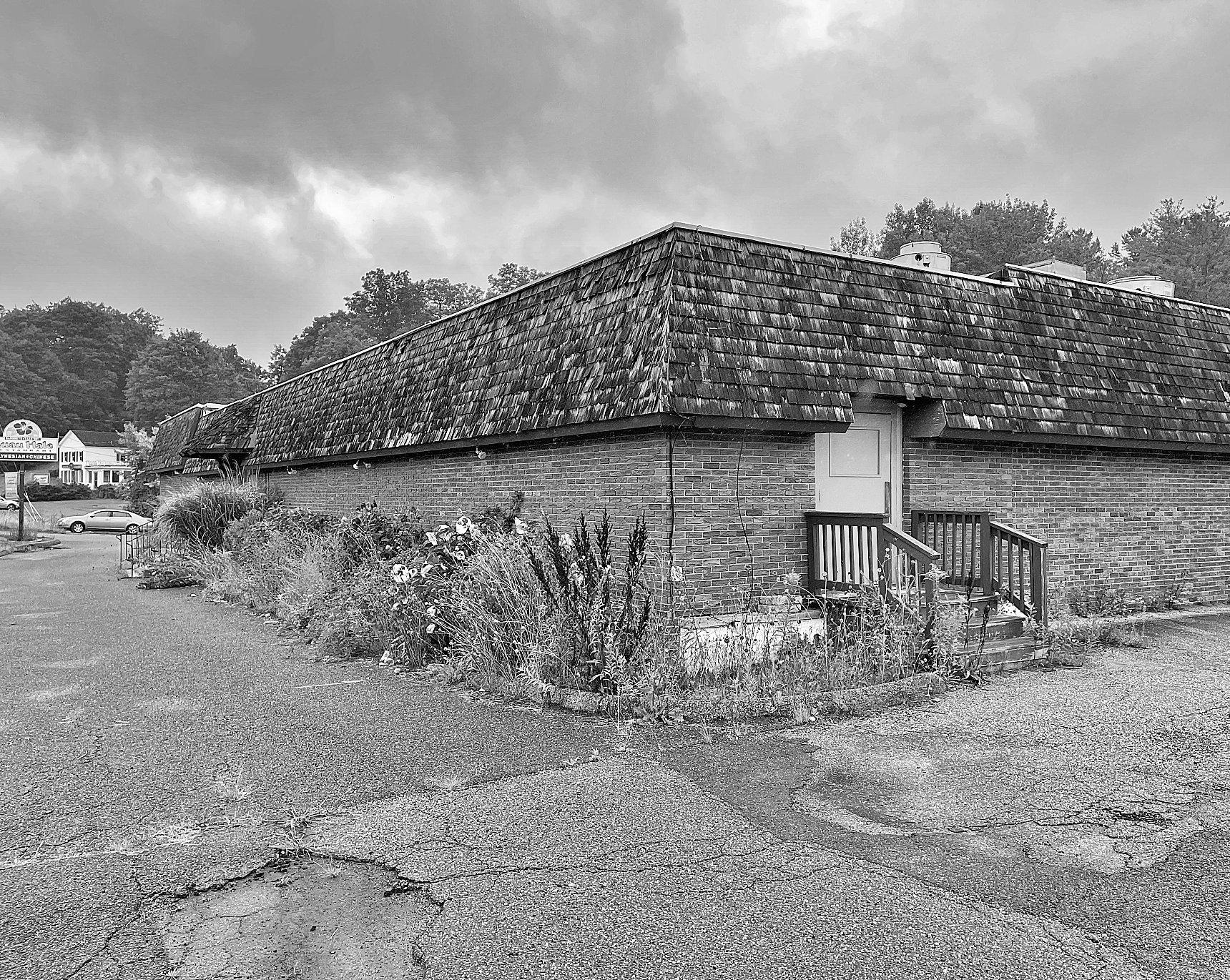
McGee Automotive purchased the Luau Hale property on Pittsfield Road from the restaurant’s former owners for $900,000. It is seeking a special permit from the town of Lenox to raze the building and create an overflow parking lot for incoming vehicles across the state highway from the new Audi, BMW, and VW dealership now under construction.
permit to use the former Luau Hale restaurant property at 365 Pittsfield Road, across the road from the main construction site.
The ZBA began its review of the application last month, but it put off any decision until its next meeting Sept. 18. McGee said in its application
that this change would relieve northbound traffic and remove its largest and heaviest trucks from New Lenox Road. McGee purchased the Luau Hale property from the restaurant’s former owners for $900,000.
According to McGee’s special permit application for outdoor

ZOLLSHAN George Haddad, the president and CEO of Haddad Auto Group, stands in the company’s collision center in Pittsfield. Haddad Auto Group recently acquired two GMC dealerships in Berkshire County, one of which will remain open.
“It’s been an incredible dealership and I’ve just so thrilled that I’ve had a job that is something I’ve enjoyed doing for all these years,” he said.
Maloney doesn’t have a child interested in taking over the business — his daughters are happy with their non-auto industry careers. He wasn’t sure where the business would go after him, but he knew he didn’t want to sell to just anyone.
“I wanted someone who was a local buyer who understands Berkshire County,” he said. “Having somebody who knows the community and has name recognition seemed like a nice fit for everyone.”
Maloney will continue to work at the dealership under Haddad’s ownership.
“I’m not ready to retire and I’m still very happy working,” he said. “There’s a small group of people here and they are like family to us.”
Haddad doesn’t plan on making any major changes to how the former McAndrews-King GMC operates, but he does plan to advertise more and put out more inventory from the manufacturer on the lot.
“They’ve got a great reputation and I just want to expand on it,” he said.
Haddad noted that, with the exception of Toyota, all other car brands in the county have only one dealership location.
motor vehicle sales, the former Luau Hale would be demolished.
It notes the Luau Hale site — two parcels totaling just over two acres — will have storage space for 102 vehicles, and that customers will not have access to the site.
Traffic flow and safety would be improved and “traffic associated with the high volume, popular Luau Hale would be eliminated,” McGee said in its application.
Two condominium complexes, Rolling Hills and Yokun Brook, are in the immediate vicinity.
McGee’s application states that the reason for acquiring and developing the second site is based on traffic safety concerns, a particular interest of the condominium abutters.
Cars will be delivered to the dealerships on the east side of Pittsfield Road by exiting through the existing northern curb cut, taking a right-hand turn and proceeding to the dedicated turn lane at the New Lenox Road traffic light.
The vehicle will complete a U-turn and enter the dealership facility on the vehicle’s right. Employees will walk to the site on the sidewalks and crosswalks along Pittsfield Road.
McGee Automotive also said the project will reduce its truck
traffic; the dealership sees an estimated three to four truck deliveries per week.
Trucks delivering cars to the former Luau Hale property would enter at the existing southern curb cut, offload or onboard cars, and then exit using the existing northern curb cut, according to the application.
The proposed project will add a new planting buffer between the existing sidewalk along Route 7/20 and install significant plantings for screening and stormwater management.
The special permit application includes a plan for downward directional and shielded lighting, which would be minimized after the lot closes at 6 p.m., leaving only motion-activated lighting during off hours.
According to McGee Automotive, the project conforms with the town’s master plan for larger-scale commercial uses in the Pittsfield Road corridor, including roadside motels, hotels, regular and fast-food restaurants, automotive service and sales, gas stations, supermarkets and big box retailers. McGee Automotive, based in Hanover, has not announced future plans for the Merrill Road property once its dealerships move.
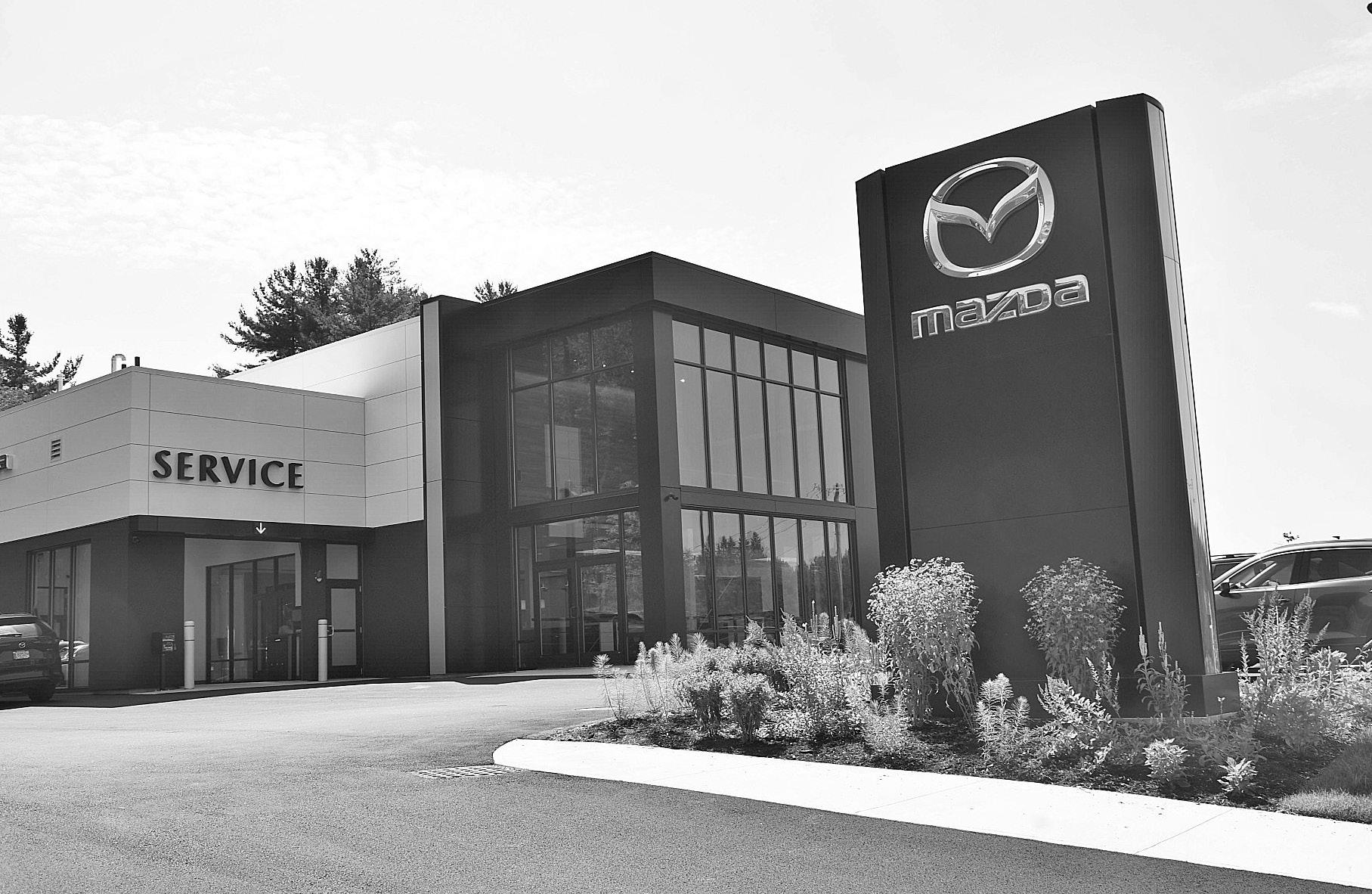
PHOTOS BY GILLIAN JONES-HECK
The exterior of Berkshire Mazda’s brand new dealership and service center at 474 Pittsfield Road in Lenox. Berkshrie Mazda owner Jim Salvie recently opened the facility, which came in a month ahead of schedule. Total project cost, including site acquisition, totaled roughly $10 million, Salvie said.
By C larenCe Fanto
LENOX — Jim Salvie started in the automotive business when he was 19, and later spent 15 years as a salesman for Haddad Toyota.
In 2007, the Pittsfield native opened Berkshire Mazda on East Street near Silver Lake. But over the years, the increasingly cramped quarters became untenable.
In a major step up, Salvie, 53, has recently moved his Berkshire Mazda dealership to a spacious new facility he built in Lenox.
“We had been trying to relocate for a while,” Salvie said. “The biggest reason is we just outgrew the other place. It wasn’t really user-friendly.”
The roughly $10 million project, including site acquisition, was completed a month ahead of schedule, he told The Eagle. The state-of-the-art, 14,500-square-foot facility at 474 Pittsfield Road (Route 7/20), on land that formerly housed the Knights Inn and an unused slice of the adjacent Howard Johnson motel property.
Because Mazda wants its franchised dealers to create the basics of what a modern auto dealership should look like; the local owners adapt the corporate playbook to the size needed by the local market.
That means the overall interior and exterior appearance of the building would conform to Mazda Corp. standards. Salvie and his team scoped out the best location and found the former Knights Inn owners ready to sell the site.
“It’s on a very busy street and the town of Lenox was fabulous with us, and it worked for everybody,” he commented. The Zoning Board of Appeals approved the special permit in early January 2023.

Still to come: Retrofitting the former Yankee Candle shop across the state highway for sales of previously owned makes and models. That location, at 765 East St., will be home to Salvie’s Signature Series of used vehicles sales once the city of Pittsfield approves the change of use.
Salvie expects prospective South County customers will be more likely to patronize the new location adjacent to Guido’s Marketplace and the businesses in the nearby Center at Lenox retail complex, which include Market 32/Price Chopper, Kohl’s, Marshall’s and 110 Grill.
The facility has 135 parking spots for new vehicles, customers, employees and the service department, compared to 80 for the original Pittsfield site. According to Salvie, about 75 percent of people who leased or bought vehicles from him return as customers.
The new location is open for sales from 9 a.m. to 7 p.m. Monday through Thursday, 9 a.m. to 6 p.m. on Friday and 9 a.m. to 4 p.m. on Saturdays. The service department, which handles all brands, is open from 8 a.m. to 5 p.m. Monday through Friday. Nine new employees have been
added to the dealership, bringing the total staff to 32, mostly full-time.
Mazda was ranked by Consumer Reports two years ago as No. 2 out of 32 automakers, right behind Subaru based on road tests, reliability, satisfaction and safety. Mazda’s SUV was rated as the top brand by U.S. News and World Report.
“Long ago, Mazda was an unheard-of brand,” Salvie noted. “My biggest problem was getting people to even think about Mazda. And now, the franchises have really taken off and they’re doing tremendously well.”
Like other automakers, Mazda is gravitating toward SUVs and smaller crossovers as sedans become less popular as customers favor the higher-up seating, he said.
Salvie describes leasing as a favorable option for drivers who log no more than 10,000 or 15,000 miles a year, although he agrees “it’s not for everybody.”
Some motorists feel they don’t really own the car if they’re leasing it, he pointed out, even though a purchased car is not actually owned by the buyer until it’s fully paid for through financing up to 72 months later.
Mazda sells hybrids but full EVs are rolling out only gradually due to uncertain customer demand, according to Salvie. He assumes gas-powered vehicles will be around for quite a few years.
Since opening his dealership on East Street in Pittsfield, “everything hasn’t been perfect; it’s been hard,” he acknowledged. “But as long as you do it the right way and treat people the way they want to be treated, it works. We want people to be happy, and I think that’s why the business has grown so much.”
By C larenCe Fanto
LENOX — After a two-month break for retuning, the downtown Cello restaurant — formerly Nudel — has reopened with a new menu.
The new managers, Kim and Ryan Boya, voiced optimism that the 28-seat bistro can find success by creating an ambience and atmosphere to encourage repeat visits, operating yearround “to be here for the local community in the winter.”
Chef Ryan Boya is a graduate of Johnson and Wales culinary program in Providence, R.I., and formerly worked at the Wild Hare restaurant in Hudson. He and his wife, Kim Boya, the new front-of-house manager at Cello, recently relocated to Pittsfield from Worcester, having met while working at the Nantucket Food and Wine Festival in 2017.
Kim Boya is a former pastry chef who worked briefly at the short-lived Field and Cellar restaurant at the Thornewood Inn in Great Barrington and Mezze in Williamstown and ran her own business, Mountains of Sugar. She’s is a native of Topsfield and he comes from Indian Lake, N.Y., in the Adirondacks.
Through a friend, they connected with Robert Fried and his wife, Karen Kowgios, of West Stockbridge, owners of the restaurant business at 37 Church St. It went dark in May after a challenging first season that included “not insignificant operating losses,” they have said.
The mission, Kim Boya stated, is to revamp the bistro, offering farm-to-table food with attention to its legacy as the highly acclaimed Nudel, owned by Bjorn Somlo from 2009 to late 2022. The couple is aiming for favorable feedback and word of mouth to achieve
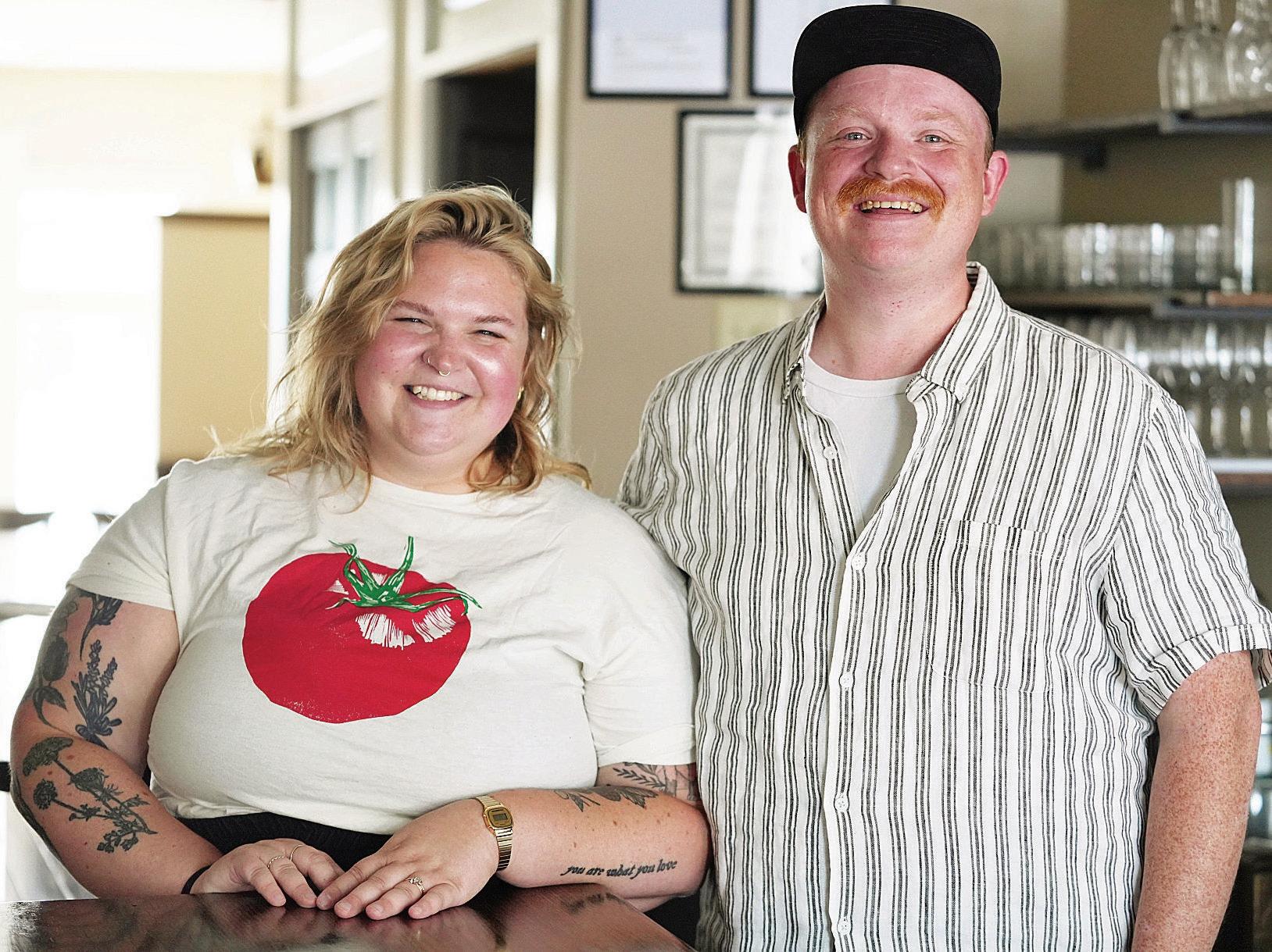
success as first-time business owners, with some coaching and support from Somlo.
“It’s a little scary,” Kim Boya conceded, “but it’s something we’ve always talked about doing, and we always thought the Berkshires would be a good spot to open a business, so it’s funny that everything fell into place as well as it did, and it’s a good opportunity for us.”
Ryan acknowledged that, with rampant inflation affecting the food industry in recent years, setting a price range is a challenge, especially with a need to
cater to visitors as well as area residents. Another goal, he said, “is to make sure we have something for everybody, whenever possible, trying to showcase in-season vegetables.”
Also top of mind, Kim said, is “staying true to our roots and what we fully believe in. Hospitality is super important to us; it’s among the reasons we’re doing this adventure, making people feel super welcome when they walk through the door, taking care of their needs such as allergens and dietary restrictions.”
She hopes that Cello will be “a neighborhood spot that locals can come to in the winter.”
The retuned Cello is open for dinner Wednesday through Saturday from 5 to 9 p.m. and on Sunday for brunch from 10 a.m. to 2 p.m. The bistro will operate with a goal of serving at least two sets of customers per table during dinner service, with half of the 28 seats turning over three times.
Menu offerings, which may change frequently, currently include small plates from $6 to
If you go ...
What: Cello bistro
Where: 37 Church St., Lenox
Hours: Open for dinner Wednesday through Saturday from 5 to 9 p.m. and on Sunday for brunch from 10 a.m. to 2 p.m.
Reservations: strongly suggested, are taken at 413-551-7183.
$15 (corn soup, grilled peaches with ricotta and tomatoes, garlic hummus and pita, chicken croquette and several salads). Larger plates include turnip fondant for vegetarians, fried haddock sandwich, braised pork belly and strip steak, priced from $26 to $30.
Desserts at $14: Roasted strawberry cheesecake with lemon sorbet and chocolate cake with cream cheese frosting and mixed berry compote.
The restaurant business is not for the faint of heart or stomach, since about 30 percent of new ventures fail by the end of year one, according to the National Restaurant Association.
Fried and Kowgios, the business owners, are “semi-retired” after selling their certified public accountant firm in Manhattan, which specialized in the theater industry. They bought the restaurant after Somlo closed Nudel in September 2022.
Renamed Cello, it opened in May 2023 and closed temporarily a year later. They have a six-year lease with two five-year extensions from building and Intown Mall owner Jonathan Molk of Housatonic LLC.
‘Pioneer’ reflects on restaurant’s legacy
‘I’m one of the pioneers of downtown Pittsfield,’ Manzo said. Trattoria Rustica closed March 31
By M att M artinez
PITTSFIELD — If there’s one thing that Davide Manzo cherishes, it’s history.
Manzo, the owner and head chef of Trattoria Rustica, 27 McKay St., grew up surrounded by it in Italy, in the shadow of the storied Mount Vesuvius in Pompeii. His roots in the restaurant business began there — his grandmother ran her own trattoria, catering mostly to sailors and limestone miners in the old country. Even though he never ate there, he always wanted his own place to follow suit.
It took years before he was able to realize that dream. Manzo was a construction worker first, then worked in a nuclear power plant before he got the opportunity to open Trattoria il Vesuvio in Lenox with his mother, sister and her husband in 1992.
But when it came time to open his own place in 2001, he studied. He dined at trattorias up and down Italy — “from Milan all the way to Sicily” — in search of the best cuisine, ultimately settling on Cucina Napoletana. Manzo took note of what made the small, intimate eateries so special, and every year like clockwork, he’d go back to Italy and research more to improve his own establishment.
“The word ‘trattoria’ means ‘to take care of you,’” Manzo said.
For a quarter of a century, Manzo took care of loyal patrons, summer tourists and anyone who popped in the door. Now, he’s

“I’m
taking care of himself.
Trattoria Rustica closed its doors indefinitely on March 31, after a health scare sent Manzo first to Berkshire Medical Center, then Baystate Medical Center for further treatment. After he recovered, Manzo decided to retire from the business to relax and enjoy life.
As Manzo put it, the restaurant business added stress — keeping things running smoothly and trying to make it through volatile, low-traffic winter months took its toll, he said. The health scare he suffered in late March was just “the straw that broke the camel’s back.”
“This was a warning for me,” Manzo said, adding that he’s not sure what he’s going to do next.
Though Trattoria Rustica has closed its doors, the space on McKay Street won’t be empty for long. The owners of Sibaritas, another Italian restaurant, announced last month that it was going to be moving from its current location at 1264 East St. some time in September.
Trattoria il Vesuvio, named for the volcano in the Manzos’ hometown, also closed in September 2023.
But Manzo always will have the history and the hard-fought success of nearly
25 years in Pittsfield with a restaurant he made from scratch. Manzo considers himself a ground-breaker in the downtown neighborhood’s revitalization effort.
“I’m a pioneer,” Manzo said. “I’m one of the pioneers of downtown Pittsfield.” Manzo first rented the McKay Street venue from Berkshire Housing Authority, transforming it from an unfinished basement into a cozy, familiar eatery. Manzo invested $380,000 into the property, calling on his experience in construction to dig down into the foundation, rebuild the walls and add a rustic wooden door to grab the eyes of any passerby on the street. Manzo even recalls calling his cousin in Italy to get instructions on how to build the trattoria’s brick oven — although neither of them had ever built one before. Brick by brick, he shaped the fiery hearth where countless meals were prepared. Manzo spent time, money and effort to make the restaurant a place where diners would come year after year. In the comments of a Facebook post announcing the trattoria’s closing, Manzo thanked his patrons for entrusting him with their “most treasured events” and the support that made the business possible. The diners, in turn, thanked Manzo for his years of food and friendship.
Manzo navigated it all “with no fear,” he said. He never asked for profit, and felt a sense of familiarity from his family’s time in the business.
“I just did it,” Manzo said. “Something inside was telling me. Simple as that.” Even though it’s over now, Manzo has something that nobody can take from him.
“I’ve got to relax,” Manzo said. “I don’t think I can work anymore, but I don’t mind — because I got history.”



former holders of the license.
It’s a delicate balance, trying to encourage new businesses while checking all the boxes — a process that Thomas Campoli, chair of the Pittsfield Licensing Board, knows well. Over the years, he’s seen his fair share of businesses get mired in the applications, which he concedes can be frustrating.
But complying with the state’s requirements, much like applying for the transfer itself, is just “a cost of doing business,” he said.
“I’m sure that the way that the people at the state level deal with the applications is not exactly the way folks that live in this community would be dealing with it, knowing that the people who applied for the transfer are really relying on that to make a living,” Campoli said. “But [the ABCC] are doing their due diligence. They have to do that.”
The economics simply don’t favor a restaurant that can’t sell alcohol, local attorneys say.
“In this community, the economics of running a restaurant that’s open for dinner just don’t work without a liquor license,” said lawyer Jesse Cook-Dubin.
For restaurants, an all-beverage, on-premise license — colloquially known as a “pouring” license — is the most valuable permit available. The ABCC regulates other types of alcohol licenses as well, such as those for package stores or beerand-wine-only licenses.
But the revenue from a pouring license isn’t open to everyone, since Pittsfield has already exceeded its license quota. The city currently allows 54 “on-premise” all-beverage liquor licenses despite having a cap of 46. The permits over the cap are holdovers from the city’s population heyday — licenses are assigned based on the number of people in a municipality, and Pittsfield has held on to its licenses from the city’s booming General Electric days.
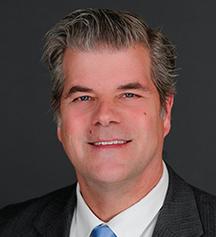
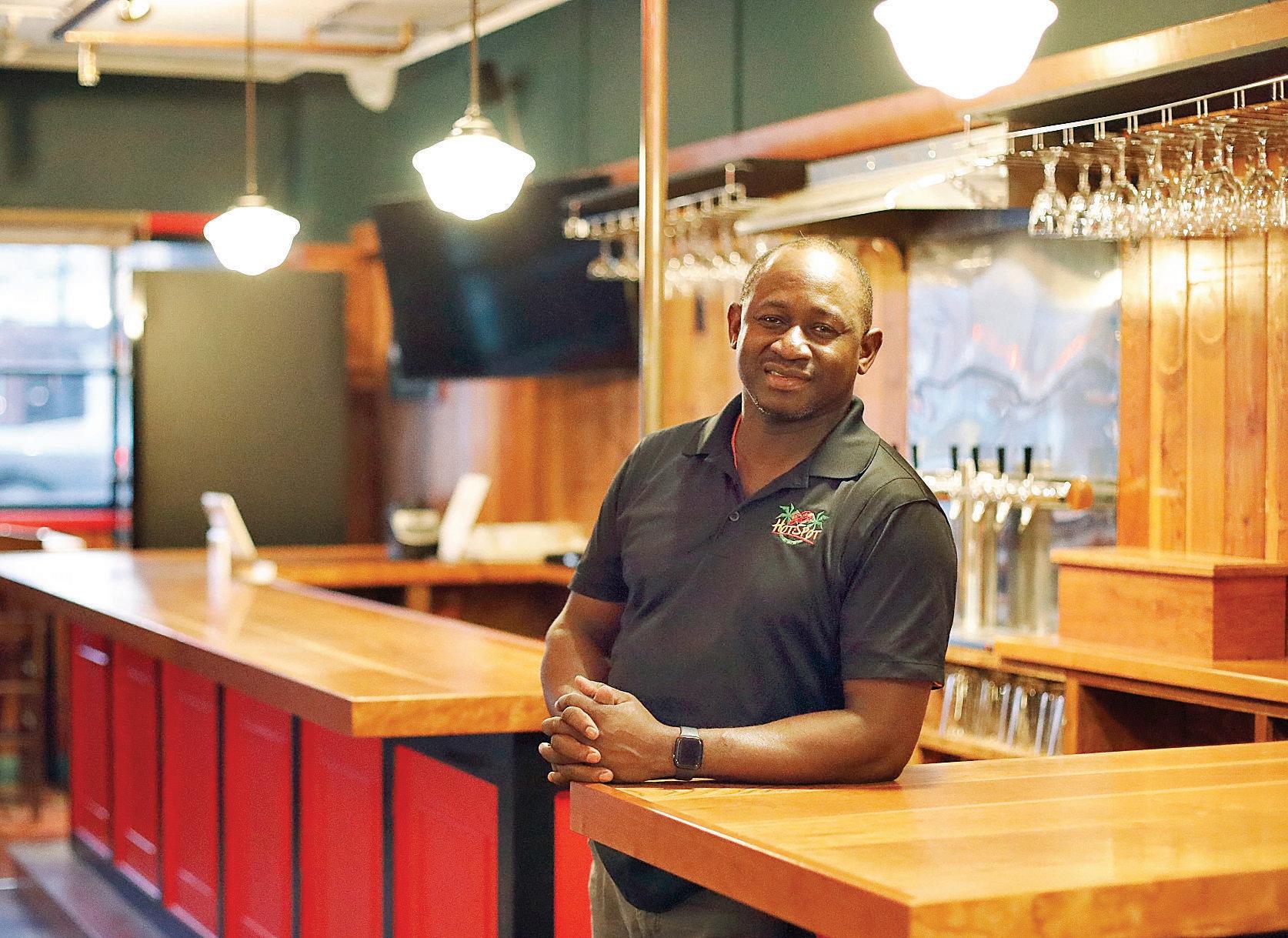
The asking price for a license in Pittsfield starts around $25,000, Cook-Dubin said, but it’s a seller’s market for the final figure. Zucco said she wouldn’t sell hers for less than $50,000.
When a business owner does find a willing seller, a litany of issues can stunt the progress of their application, Cook-Dubin said.
Though, Ralph Sacramone, executive director of the ABCC, said the applica-
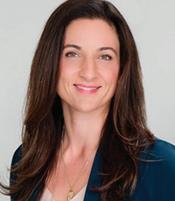
tion process is relatively straightforward but an applicant must follow the instructions to the letter.
Sacramone said if everything goes according to plan, the process shouldn’t take more than four weeks — applicants who are delayed by months are likely experiencing issues outside the commission’s control.
The average process time locally is about six to eight weeks, Cook-Dubin


said, with no issues.
But when it comes to compliance with the state’s liquor regulations, “all bets are off,” Cook-Dubin said. Small errors can end up costing businesses weeks, months — or even longer.
“Every lawyer I know that does this work has had an application that’s been on hold for a year or more,” Cook-Dubin said.










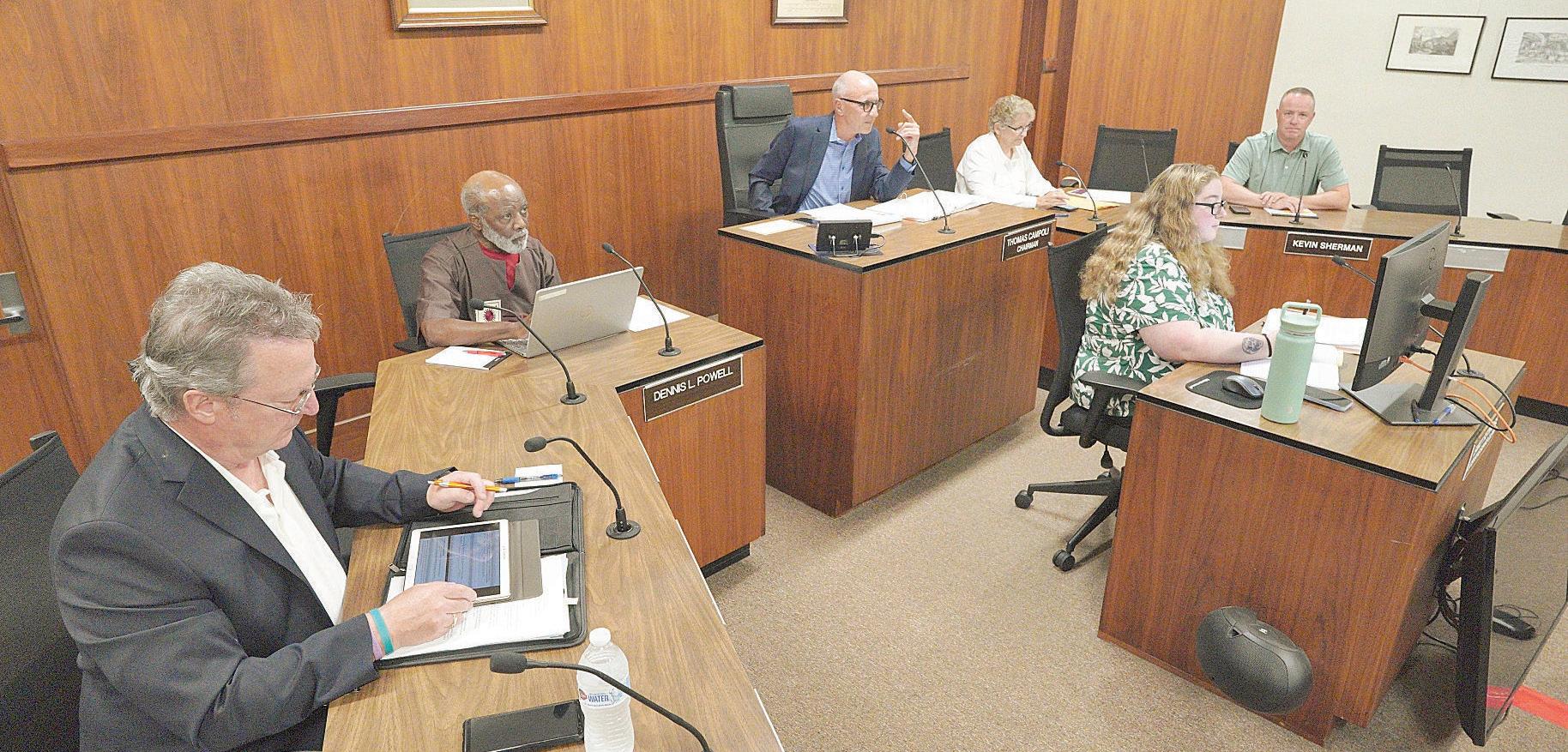
‘AS MUCH TIME AS YOU NEED’
The liquor license application process is relatively simple from the ABCC’s end: The commission’s licensing division receives an application, an inspector reviews it, then it goes to Sacramone’s desk.
From there, the application gets passed along to the three commissioners that oversee the entire agency. If two of those three commissioners sign off, the license is enacted and the cocktails can stir.
But ensuring that those applicants are in compliance with state law is where things get tricky. In short, everything that an applicant submits needs to line up exactly with the operations on the ground — down to the last detail.
The square footage and dimensions of the restaurant, the name of the brickand-mortar business and the corporation managing it and even information about the building’s landlord could be a snag for prospective owners.
Sacramone said many applicants err on Question 6 of the liquor license application, which asks proprietors to list in-
formation on everyone with an ownership interest in the company. It’s common to see incorrect information in this section, including mismatched titles and ownership stakes, Sacramone said.
The commission also ensures the “character fitness” of proprietors — the manager and anyone with an ownership stake must submit a Criminal Offender Record Information check to verify that they haven’t been convicted of a crime. State law does not allow convicted felons to operate businesses with a liquor license.
If a former business owner owes any back taxes to the state or unemployment
assistance to its former staff, that has to be resolved before a license transfer. Often, the landlord of the property or the new license holder end up paying the debts of the previous license holder to keep the liquor license alive.
Cook-Dubin said citizenship requirements can be a hurdle for immigrant-owned businesses. State law says a license cannot be issued if the majority of a business’ directors are not U.S. citizens. House of Seasoning, the West African restaurant owned by Mathieu Niamke and Raissa Doumbia, encountered this

problem in January 2023. The initial application submitted by Niamke and Doumbia, natives of the Ivory Coast, was denied by the ABCC because the citizenship requirements were not satisfied.
House of Seasoning received its liquor license in March 2023 after resubmitting the application. The restaurant closed in March 2024 after an unrelated dispute with its landlord.
“When you have a citizenship requirement you are keeping immigrants out of the restaurant industry; when you allow a license to get tied up because of problems with owners’ debt, you’re preventing someone else from using that license,” Cook-Dubin said. “It’s ultimately the community that suffers from both those things.”
The commission gives guidance to immigrants on how to structure their businesses to avoid that problem, according to Sacramone.
Regardless of what the issue is, he said, the commission will give applicants the chance to rectify what needs to be fixed.
“We give you as much time as you need to straighten it out,” Sacramone said.
‘BACK AND FORTH’
Each time Pittsfield Attorney Bill Martin takes on a new client involved in a liquor license transfer, he worries he’ll come across a new hiccup.
“It feels a little bit like ‘Mother, may I?’” he said. “You do your best, and then you get your homework corrected, and you find out that you got a 97 when you needed 100. So, you gotta go back and do it again.”
When representing his clients Ronny and Louise Brizan, the owners of BB’s Hot Spot, he didn’t get the perfect score his clients needed.
The Caribbean restaurant has been open at its new location at 455 North St. since Jan. 1, but only got its liquor license on May 22. For the first five months of trying to establish themselves as a full-service eatery, the Brizans couldn’t serve liquor.
The application to transfer the liquor license from the previous restaurant in the space was held up by a clause in their lease, stipulating that the landlords of the building — Mill Town Capital — would gain ownership of the liquor license if the Brizans defaulted.
Martin said he has used similar language before, but the transfer application was denied, sending the Brizans back to the beginning. With each roadblock, the couple incurred more legal fees.
“It added cost because we had to go back and forth,” Louise Brizan said.
Ronny Brizan said the delay frustrated customers who wanted to buy drinks and employees who had to wait until the restaurant could sell alcohol to get more work hours.
“Without the liquor license, it kills my momentum,” Ronny Brizan said.
In the case of the Zuccos and Bei Tempi, the transfer from Jerry Colvin, the owner of the Crossroads Cafe, which closed nine months ago, proved problematic.
The liquor license wasn’t in Jerry Colvin’s name, but in the name of his wife who died 10 years ago. The Crossroads
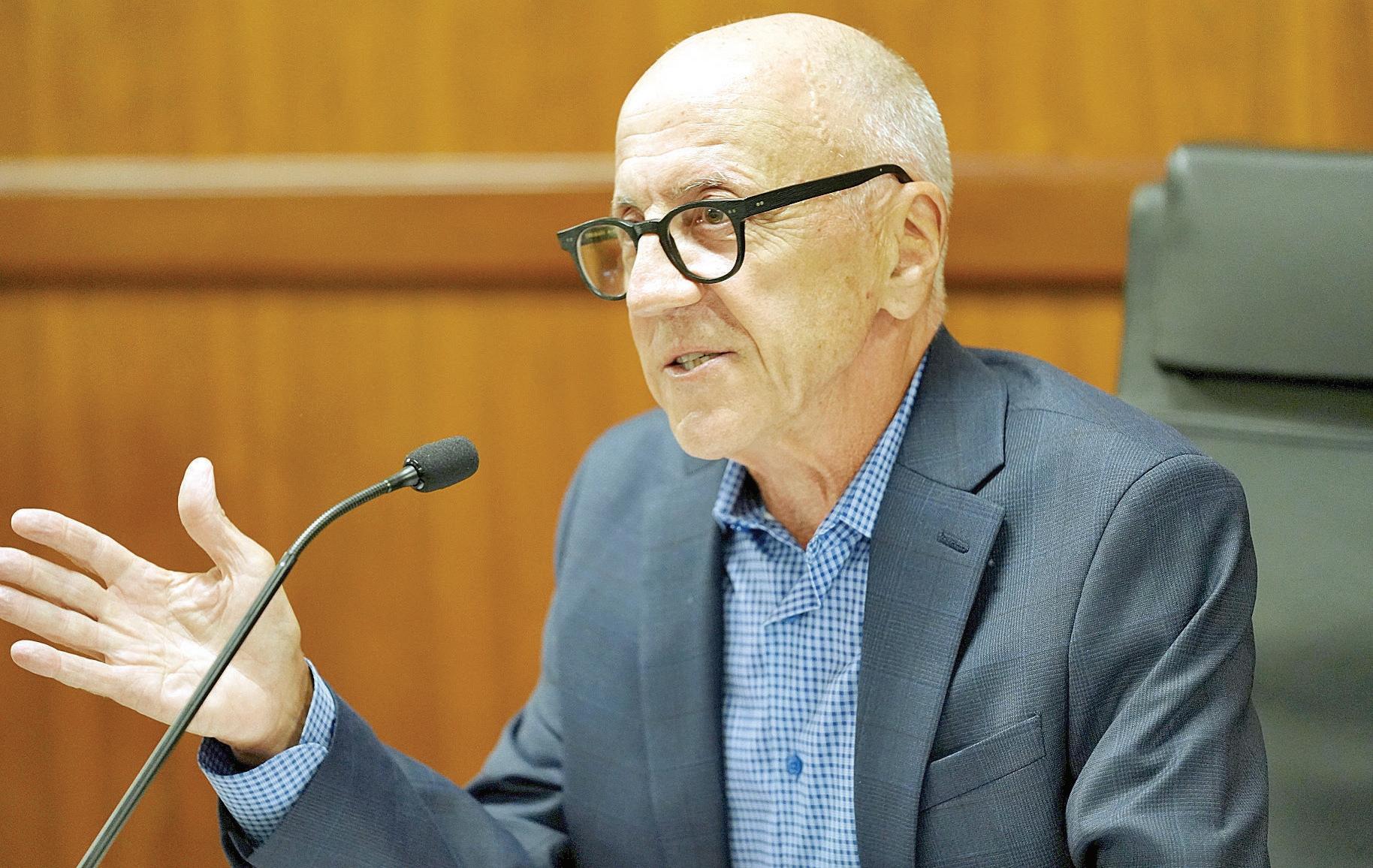
Cafe continued to pay its annual fees and renew the license, but when the ABCC realized the owner of the license was no longer living, they had questions that delayed the transfer for over a year.
Elizabeth Zucco doesn’t blame Colvin for the oversight.
“He just was trying to bury his wife, keep his head above water, run his company, mourn with his children, and keep his s- — going,” she said.
While Zucco waited for the license transfer, she was paying for a commercial property that wasn’t bringing in any money.
“I had to sit on my down payment for eight months,” she said.
Despite the hassle and loss of profits, Zucco sees the value in regulating liquor, and added that she sees having a license as an honor and takes it seriously.
“The strict laws are made to regulate it for a reason, to keep that control over crowds,” she said.
With licenses in-hand the Brizans and Zuccos are trying to make up for lost time.
“We are thinking about moving forward and how we can make it profitable, watch our expenses, and stay afloat,” Ronny Brizan said.
NO ‘APPETITE’ FOR CHANGE
The consequences of a failed liquor license application almost always land hard on business owners who have already begun investing heavily, Cook-Dubin said.
But the state law is not likely to change soon, according to state Rep. Tricia Farley-Bouvier, D-Pittsfield, who said changes on the local level are more likely.
“I really haven’t seen an appetite for that,” Farley-Bouvier said. “What people tend to want to do, community by community, is ask for more liquor licenses because a big problem with these is that there’s a scarcity of them.”
Farley-Bouvier said she wants to see more education opportunities for business owners.
Sacramone said the commission regularly hosts workshops across the state, adding that a session will likely be held in Pittsfield in the coming months. An official date has not been scheduled yet, he said.
Campoli said a seminar to help guide applicants through the process and “clear up some of that mysterious language” could be invaluable.
Campoli recommended that any prospective applicants hire a lawyer to help them through the process, and make use of the ABCC’s online resources to get a better sense of the requirements.

State Rep. William “Smitty” Pignatelli, D-Lenox, has had a long working relationship with the ABCC and lauded them as highly responsive and helpful. Pignatelli said more education from the state down would benefit both local business owners and attorneys, as the process can be challenging without reinforcement.
“If you don’t do it on a regular basis, it’s hard to understand how it works,” Pignatelli said.
As the process stands now, even those who frequently deal with liquor license applications feel unclear about all the details.
“As many times as I’ve done it,” Martin said, “I’m worried I’m going to learn something new.”




President Eisenhower famously said, “In preparing for battle, I have always found that plans are useless, but planning is indispensable.”

Here, Eisenhower distills an essential truth about financial planning. A financial plan doesn’t mean knowing exactly what will happen, but it does mean having a plan in place for the curveballs that come your way. It means understanding the resources that are available and how best to adapt.
We all know life is full of change. Some changes are choices completely within our control such as when to retire, take Social Security, or get married. Some changes are somewhat within our control such as how much do we spend versus save and how do we react to market moves.
Some important factors are also completely outside of our control such as how long we will live, what tax rates will be, and how much inflation we’ll experience. In each case, though, a financial plan can help you consider your options when your stable path inevitably gets disrupted. There are myriad examples where thinking ahead provides solutions that can be implemented when the unexpected comes your way. What happens if you get hurt on the job?
Disability insurance can help if you’re forced to miss work. What happens to your family if you pass away? Life insurance helps create financial


There are myriad examples where thinking ahead financially provides solutions that can be implemented when the unexpected comes your way, notes columnist Luke Delorme.
security for those you leave behind. What happens if the stock market tumbles? An understanding of your near-term cash needs can ensure you have the resources and calm to avoid selling when stocks are down. Take my personal life as another classic example. I recently switched jobs. As a result, I have had to deal with many financial questions: How will my income change? What about my health insurance? How will contributions to retirement plans and educational savings plans change? Do I need to adjust my budget? Thankfully, my detailed financial plan helped me manage my emotions and feel confident to take the leap. My brief lull in

employment income was bridged by an emergency savings fund. By maintaining several months’ worth of spending in cash, I felt comfortable exploring the job change and then had the breathing room to make the switch.
Next was the loss of health insurance from my prior employer. Although the prospect of selecting, and paying for, a new health insurance plan was a little daunting, I worked with my business partner, a fellow financial planner, to review my options, and it turned out to be less painful than expected.
Finally, my wife and I considered whether our budget and savings would need to change during this transition
period. A few small adaptations — cut a subscription here and there, eat at home more frequently, more peanut butter sandwiches (no complaints here!) — and we feel comfortable that we’ll be able to cover our regular expenses during the transition without much stress.
Peace of mind does not come easily during major life transitions. The key to achieving it is an understanding of current circumstances and a solid contingency plan. For me, having a financial plan means that I know how much we have in the bank, how much we have in emergency savings, how much we have in investments that are readily accessible, and where we can borrow from if needed. It also means that we know how much we spend on needs such as mortgage and food, versus how much we spend on discretionary things like cable and restaurants. These are the building blocks of a solid financial plan. They don’t require immense intelligence, but they do require thoughtful effort and structure.
Financial and life planning aren’t about having all the answers. Rather, they are about having the tools and resources to adapt as needed. Life changes are hard. I’m thankful that I’ve been able to alleviate some of the financial stress by having a good understanding of my financial plan.
This comfort has allowed me to pursue the next chapter in my life, and I’m thrilled for the opportunity. That’s the power of planning.
Luke Delorme is director of financial planning at Tableaux Wealth in Stockbridge.


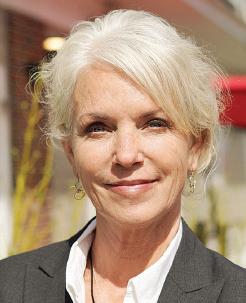
In his farewell column, Pete Wells, the renowned New York Times restaurant critic, issued a poignant observation about the state of the restaurant industry. He lamented that many establishments are becoming “vending machines with chairs,” where the lack of meaningful human interaction leaves diners with a hollow experience.
Wells noted that while meals may be faster and cheaper, the absence of engaging customer service leaves us feeling empty. When it’s time to go, there’s no longer a sense of connection with the host — if a host even exists anymore.
This trend toward automation and the erosion of personal touch isn’t confined to the restaurant industry; it’s permeating many sectors, including the burgeoning legal cannabis industry.
As we reflect on Wells’ words, it’s essential to consider how these dynamics are playing out in our local cannabis market, especially here in the Berkshires. The question we must ask ourselves is not just about the efficiency of our operations, but something far more profound: Who do we serve?
At its core, the cannabis industry — particularly on the retail side — thrives on the quality of human interaction. While kiosks, online ordering, and streamlined processes offer convenience, they should not come at the expense of the personal touch that defines an exceptional customer experience.
As cannabis businesses, we have the opportunity—and the obligation—to serve our community with integrity,

compassion, and a commitment to building lasting relationships.
The Berkshires is more than just a picturesque region; it’s a tight-knit community where businesses and residents are interconnected in a way that is rare in today’s world. Our local economy thrives on these connections, and as cannabis retailers, our primary responsibility is to serve the people who call this region home.
From North County, to Pittsfield, to the dense cannabis business landscape of Great Barrington, to the
charming spirit of Lee where Canna Provisions has been operating since 2019 and voted Best Dispensary in Massachusetts more than any other dispensary in the Berkshires, we are part of a broader ecosystem that demands our full engagement. However, our reach extends beyond the Berkshires. The nature of our business brings in consumers from neighboring regions as part of the tourism economy here, making us a regional hub for cannabis culture. This dual role—as local service providers and regional leaders—requires us to strike a delicate balance between

efficiency and the human touch.
THE CASE FOR HUMAN-CENTERED CANNABIS RETAIL
In today’s competitive market, it’s tempting to lean heavily on technology to streamline operations and cut costs. While kiosks and online pre-ordering systems have their place, they should complement, not replace, the human elements that make cannabis shopping a unique and enriching experience. The best dispensaries and cannabis brands are those that combine convenience with an unwavering commitment to customer service.
Here’s why this matters: As of 2024, according to Flowhub data and recent Gallup polling, half of American adults have tried cannabis, and 79 percent of Americans live in a county with at least one dispensary. And yet, so many adults, including right here in the Berkshires, have yet to enter a dispensary.
Some don’t yet understand the difference between the Farm Bill loophole allowed, hemp-derived D9 THC products found at gas stations, versus the safe and tested real legal cannabis products in Berkshire retail dispensaries.
So as the cannabis industry matures, so too do the needs and expectations of our consumers. They are no longer just seeking products; they are seeking education, and reliable experiences.
When they walk into a dispensary, they’re looking for more than just a transaction — they’re looking for a connection. They want to engage with knowledgeable staff who can guide them through their cannabis journey, whether they’re first-time buyers or seasoned enthusiasts.
Moreover, consumers are becoming increasingly discerning about the brands
CONNECTION, Page 15







they support. They are asking critical questions: Does this business prioritize quality over quantity? Are they committed to ethical practices and fair treatment of their employees? Do they contribute positively to the community?
In essence, they are looking for brands that stand for something—and that something is often rooted in the quality of human interaction they experience.
BUILDING TRUST THROUGH
HUMAN CONNECTION
To succeed in this evolving landscape, cannabis businesses must focus on building trust through genuine human connections. This means investing in staff training to ensure that every interaction is meaningful and informative. It means creating a welcoming atmosphere where customers feel valued and understood. And it means being transparent and honest in all our dealings, from product sourcing to pricing to community engagement.

Dispensaries and brands that excel in these areas will not only attract loyal customers but will also set themselves apart in an increasingly crowd-
ed market. They will become beacons of quality and integrity, known for their commitment to both product
excellence and customer care.
But perhaps most importantly, they will help to elevate the cannabis industry as a whole. By prioritizing human connection, we can ensure that the industry remains true to its roots—a movement that has always been about more than just commerce. It’s about community, healing, and creating a better, more inclusive world.
In the rush to innovate and scale, it’s easy to lose sight of what truly matters. But as Pete Wells reminds us, efficiency without humanity is a recipe for emptiness. As cannabis professionals, we must resist the urge to become “vending machines with chairs.”
Instead, we should strive to be the hosts who greet our customers with warmth, knowledge, and a genuine desire to serve. By doing so, we’ll not only see greater long-term success but also ensure that our industry remains a vibrant and vital part of the communities we serve.
Meg Sanders is CEO and co-founder of Canna Provisions.




The Nonprofit Center of the Berkshires is often the place people turn to for help with nonprofit startups.
In my experience, the majority of nonprofit founders have a legitimate concept for a needed program or service that fills a gap in our community. Regardless of whether an idea seems duplicative or not, we always mention the alternatives to starting a nonprofit including partnering with existing entities, creating a business with a fee-for-service model, and fiscal sponsorship.
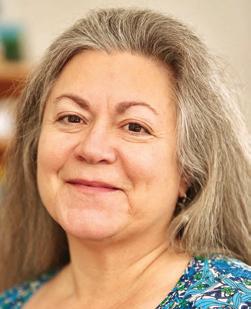
needs families to gather, learn, and grow together. Its mission is to support, encourage, and strengthen individuals and families, to achieve its full potential as a community member, and to facilitate the building of relationships between individuals who have developmental disabilities and other members of the community.
While NPC offers fiscal sponsorship, we encourage startups to seek out similar organizations as sponsors so they can reap the benefits of their sector knowledge, not just their 501c3 status.
Startups don’t always succeed, especially if a founder has not gathered a large-enough team of volunteers and supporters or is otherwise occupied by a full-time job or family obligations. But many gain traction almost immediately and go forward to obtain their own nonprofit status.
A great example is Latinas413 (a fiscally sponsored project of NPC) which, over the course of three years, has several established programs, grant funding, and soon, its own nonprofit designation.
One of the greatest challenges for fledgling nonprofits is awareness. If only people knew about their endeavors, these organizations might find just the right combination of helping hands and donations to propel them into sustainability.
Described here are just a few of the newer organizations forming to ensure everyone thrives in our community.
Families Like Ours wants to create a safe and inclusive space for special
It guides people to resources available in the Southern Berkshire Community with a goal of decreasing feelings of isolation. Its biggest barriers are finding affordable, centrally located space in Great Barrington and funding to provide free programs.
Great Barrington Library Fund is a new nonprofit fundraising organization with a mission to support the needs of the Mason and Ramsdell libraries of Great Barrington. Its initial focus is to raise funds for renovation of the Ramsdell Library. The building has the honor of being listed on the National Register of Historic Places in 2014.
The library has not had any renovations since 1937 and is in desperate need of capital improvements to bring it up to present standards. The fund was initiated by a group of local citizens who wish to provide the town with a sustainable, healthy, community-engaging place for future generations.
Heart & Soil Collective is a Berkshire County nonprofit feeding seniors and hospice families, supporting local farms, connecting people with agriculture and each other. Founded in 2021 by farmers Kristen Tool and Chris Wheeler to provide free, fresh food to a dozen seniors in Lanesborough, programming has since expanded to delivery to 100 homes across 10 Berkshire County towns, purchasing
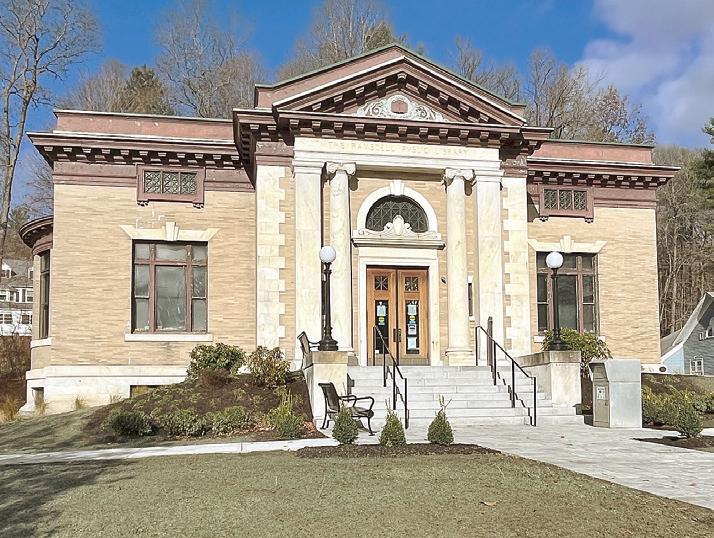
Great Barrington Library Fund’s initial focus is to raise funds for renovation of the Ramsdell Library in Housatonic, above, which is in desperate need of capital improvements to bring it up to present standards.
food from 12 local farms, and engaging more people in agriculture.
Heart & Soil Collective’s 10-year goal is expansion into every Berkshire County town. By delivering free, fresh food to homes, Heart & Soil’s programming helps address food insecurity and isolation and builds community.
Partnerships with local farms puts money in the hands of farmers. Farm tours, workshops and volunteer days help connect the community to farms in their neighborhoods, strengthening the local food system.
The Longest Night is dedicated to transforming lives in Berkshire County by providing transitional housing for individuals emerging from jail, treatment programs, abusive situations and homelessness. Its mission extends beyond shelter; aiming to empower residents by connecting them with vital community resources.
It assists with obtaining essential documents like photo IDs, birth cer-
tificates and social security cards, and supports its journey toward independence through job search assistance, access to food, medical care and more.
The Longest Night is considering various nonprofit structures and is seeking passionate volunteers and collaborative organizations to join them in this vital mission of offering hope and stability to those in need.
Seeing Rainbows emerged from the interactions of trans people and existing LGBTQIA+ organizations in the Berkshire region. What began as an online connection for Berkshire Stonewall support groups, evolved to include additional social activities such as parties and hikes.
By spring 2024, enough programs had been established to consider forming a nonprofit, which quickly received its nonprofit determination from the IRS and has been awarded its first grant. In a few short months, Seeing Rainbows has launched five programs, held three public events, and engaged in deep community partnerships.
Nonprofit founders are often people who clearly see a need and are motivated to create a solution to fill that need. They struggle in a chicken and egg situation, needing proof of concept before funding is forthcoming, but needing funding to create the actual program or service. Many sacrifices are made to advance the mission.
Success is a combination of skill (in amassing critical support and getting the word out), luck, perseverance, and courage. Thankfully, many startup organizations can count on community members to respond positively with donations and time, helping nonprofits go from fledgling to full-fledged Berkshire assets.
Liana Toscanini is the founder of Nonprofit Center of the Berkshires.












By Sten Spinella
WILLIAMSTOWN — Berkshire
Livery, a new addition to the sparsely populated for-hire driver field in Northern Berkshire County, has arrived.
Lisa Donovan, Tanya Cravish and Marlene Champagne have come together to form a woman-owned-and-operated livery service, with its headquarters in Williamstown, that will take you where you need to go, as long as you’ve arranged a pick-up time.
“When you call a taxi company, you hear 10-15 minutes for a taxi, then you can wait up to an hour,” Donovan said. “That’s a lot of the dissatisfaction customers associate with a taxi business. A livery service is based off of timed calls.”
People can still call in asking for a more urgent ride, but no matter what, when people call in, they’ll be given a specific time to be picked up.
The new business expects to transport people locally who are grocery shopping or need to get to doctors’ appointments, for example. It is also offering a contracted courier service. The company description has it focusing on “airport transfers and cab services.”
“We are in the process of ironing out some contracts with the hospitals — for confidentiality purposes we can’t release the name of the contract,” Donovan said. “We are also ironing out contracts hopefully with organizations that help women and children.”
Donovan said Berkshire Livery is betting on the fact that RJ’s Taxi is the only other comparable service in the area.
“More and more people are getting cars, and transportation services are less than what they were,” she said.
But Donovan points out that there are some populations — specifically seniors — who need
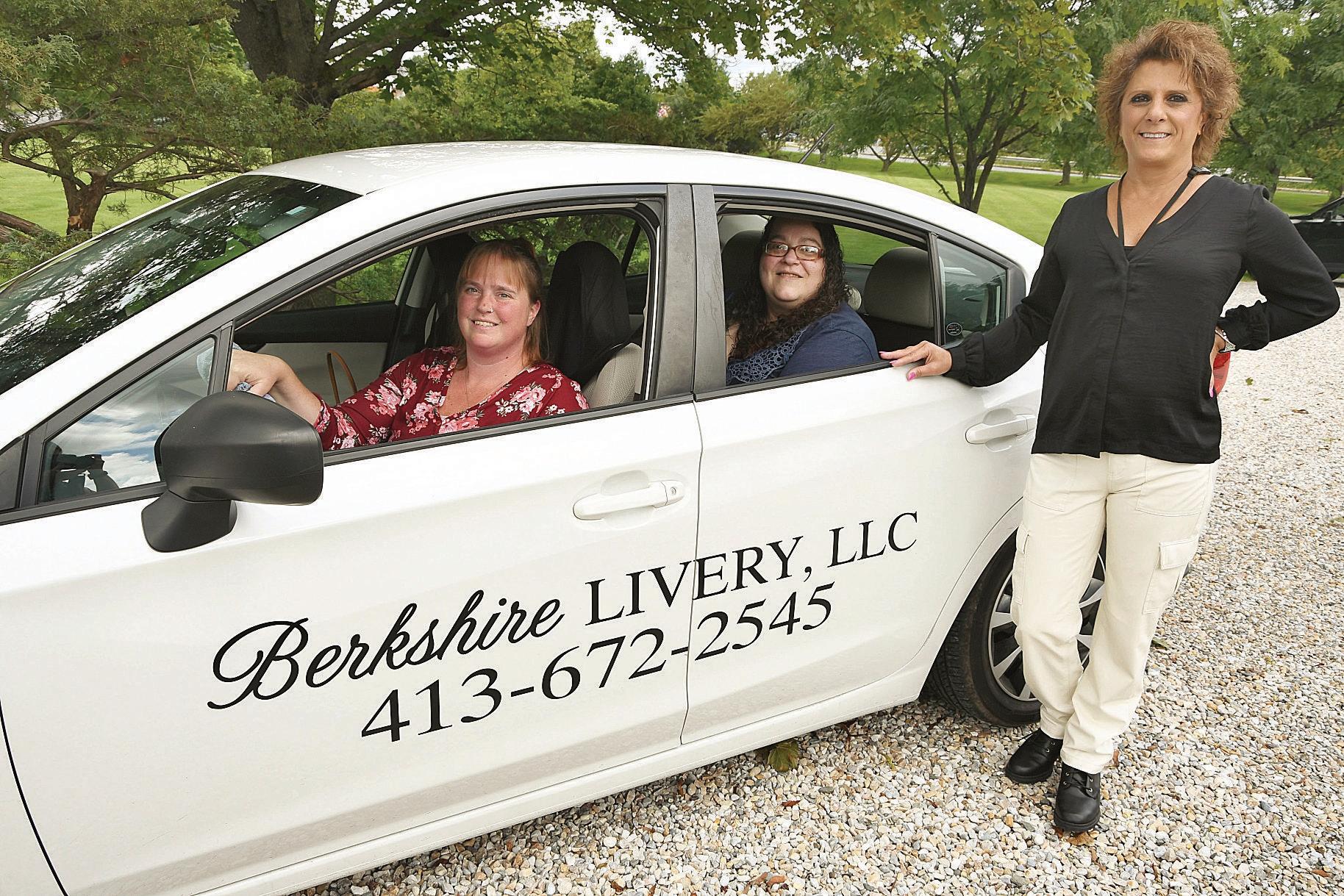
Employees of Berkshire Livery are from left, Lisa Donovan, Tanya
and Marlene Champagney. “We’re here to assist our elderly and local community with wherever they need to get to,” Donovan said.
help getting around town.
“Sometimes RJs is booked solid for an hour,” she said. “We’re here to assist our elderly and local community with wherever they need to get to.”
The business is already in full swing, and is in the midst of hiring. The plan is to add female drivers to the several male drivers they already have on staff.
Donovan did not set a limit on how many people they’re looking to hire.
“Our biggest thing is being
“Our biggest thing is being women-owned and run. We want to provide safe, reliable rides and for the community to trust us.”
liSa Donovan, co-owner of Berkshire Livery
women-owned and run. We want to provide safe, reliable rides and for the community to trust us,” she said. “It was the passion of Tanya’s and mine to eventually open our own company, but it takes a lot of money to do that.”
That’s where Champagne, who owns Berkshire Livery independent, got involved. Donovan and Cravish used to work at OTT Taxi together before it closed in recent months. Berkshire Livery’s headquar-
ters are at the same location that OTT was for its last several months in Williamstown. But Donovan made it clear that Berkshire Livery has no connection whatsoever to OTT Taxi, and is its own business.
Former OTT operator John Lord has not responded to multiple requests for comment over the last two months about what happened to his business. Donovan confirmed there is no limit on how far Berkshire Livery will drive someone to their destination.
By C larenCe Fanto
LENOX — The three-story, 87-room Element Hotel by Westin that is rapidly taking shape on Pittsfield Road will not officially open until next year. But its owners couldn’t wait to celebrate.
BBL Hospitality of Albany, N.Y., owner of the hotel under construction at Berkshire Terrace on Route 7/20, held a public ceremony last month to chart the progress of the high-end hotel.
The project is expected to cost $30 million to build.
Element is a “longer-stay” Marriott hotel brand aimed at guests planning to book rooms for five days or more, said Carrie Hillenbrandt, senior vice president of BBL Hospitality/Recovery Sports Grill. The hotel, occupying 65,000 square feet, is slated to open in June 2025.
The property is part of a larger development at the Berkshire Terrace site at 130 Pittsfield Road, opposite West Dugway Road, Hillenbrandt said.
Future planned construction includes a seven-building, three-story mixed-use apartment community adjacent to the hotel for leaseholders such as executives or seasonal visitors planning to stay for six months to a year, with no sublets, Airbnb or other online rentals allowed.
The developer won a special permit and site plan approval for the project in December 2022.
The 13-acre site adjoins Allegrone Cos.’
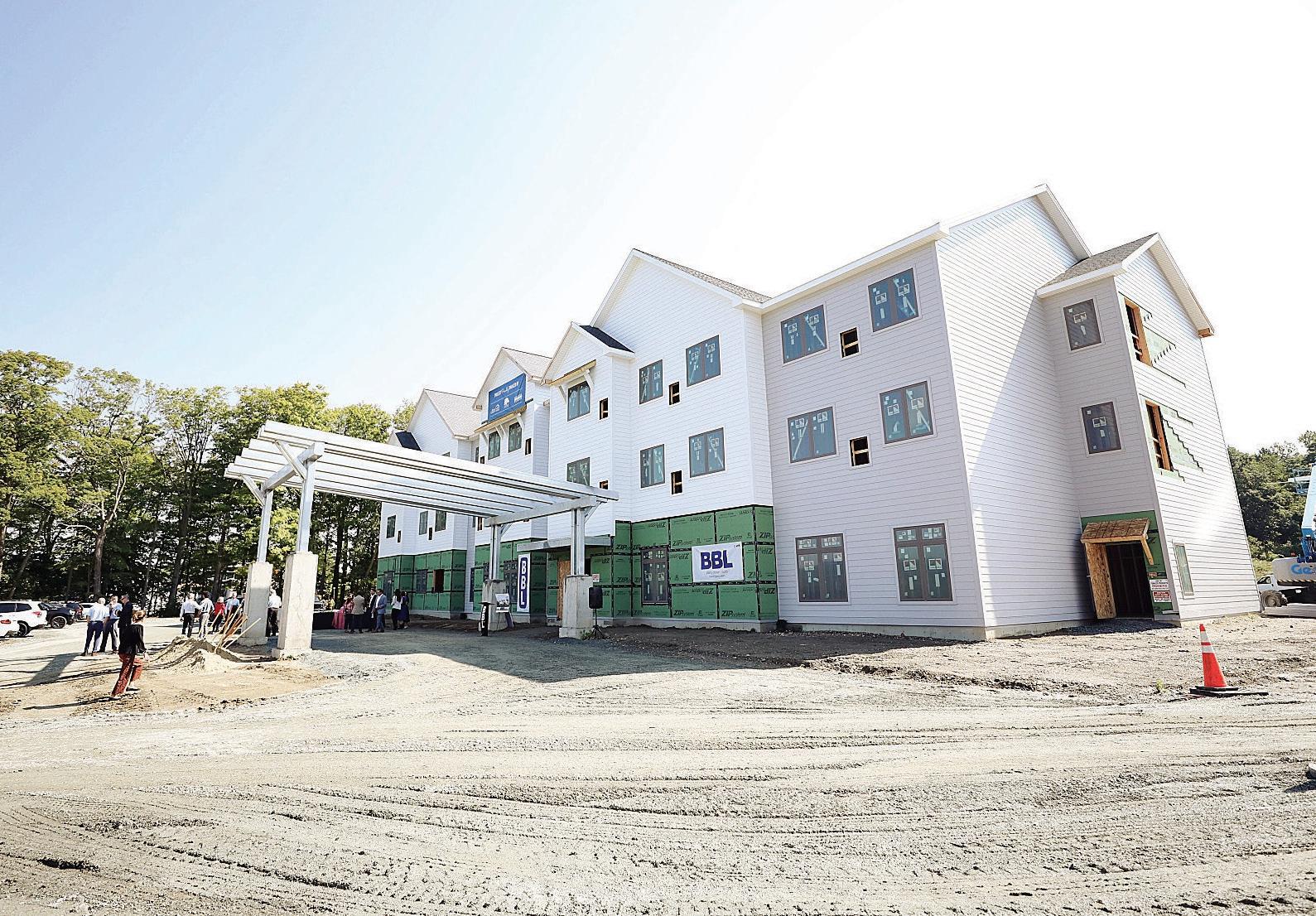
Berkshire Design Center to the north and undeveloped land to the south and east.
The location previously hosted the Magnuson Hotel, which closed in 2017 and was demolished the following year. It had 120 rooms with a 96-seat restaurant and a 360-person function room.
It was originally built as a Holiday Inn in 1964; later incarnations included a Quality Inn and EconoLodge, as well as a Lenox Manor project that never got off the ground.
BBL Hospitality’s portfolio includes 22 hotels, 15 restaurants (14 of them Recov-
ery Sports Grills, mostly along the East Coast), and two banquet facilities. Its properties — including Hilton, Holiday Inn, Hyatt, Marriott and Sheraton hotels — are located in upstate New York, New Jersey, Charleston, W.Va., and in Titusville and Port Saint Lucie, Fla.
“We don’t build it and run away,” Hillenbrandt told The Eagle earlier this year. “We have to make it work, manage it and employ the folks who work in the hotel, and we get extremely involved in whatever community we’re in. It’s very important to us, it’s the backbone of the company.”
The hotel project is the fifth active construction site along a two-mile stretch of the busy state highway — including a Starbucks cafe; a new Lipton Energy car wash, both in Pittsfield; and in Lenox the recently opened Berkshire Mazda store and the pending $14 million McGee Automotive’s Berkshire Audi, BMW and VW dealership, both relocating to Lenox from Pittsfield.
Berkshire Mazda plans to convert the former Yankee Candle shop across the highway into a facility for used vehicles and for rentals. McGee plans a similar spinoff project, replacing the closed Luau Hale restaurant on Pittsfield Road with a site for offloading vehicle deliveries and inventory storage. McGee paid $900,000 to acquire the property from the family company that had owned the restaurant.





BY A LLISON M IKANIEWICZ
TEDx Berkshires began in 2010, under the leadership of Ethan and Jamie Berg and Mark Liponis, who were committed to make the event a driver of inspiration, innovation, and education for our community.
The event has been held annually at different locations in the region and featured talks from many prominent locals, including former Gov. Deval Patrick. Last year, encouraged by the event founders and members of the Berkshire Innovation Center’s board of directors, we brought the event to the BIC, with all parties convinced that the BIC was a natural fit to host and partner in producing.
We had seven impactful speakers last year, all focused on a message of hope and optimism and solutions to the world’s most existential challenges. We are thrilled to be hosting TEDx Berkshires at the BIC again on Oct. 10, as a dynamic group of thought-leaders take the stage and share their stories with our community and the world at large. Here is a taste of what you’ll see:

Brad Corrigan is a world-renowned musician and co-founder of the band Dispatch. Brad is also the founder & CEO of Love Light + Melody, an organization he started after his many visits to La Chureca in Managua, Nicaragua, where he witnessed children and families living in unimaginable and toxic conditions. The goal of Love Light + Melody is to offer an opportunity for these children to grow and thrive through education, music, art and sports. One child in particular that he met there inspired him to create the documentary “Ileana’s Smile.” Brad’s talk, Reimagining Poverty Through the Lens of Belonging to Each Other, will focus on his journey from rock musician to change agent for children is Nicaragua.

Sarah Eustis is founder & CEO of Main Street Hospitality. Sarah’s career spans three decades, with leadership roles at renowned apparel companies. In 2012, she returned to the Berkshires to lead the third generation of her family’s hospitality business. Since her arrival, she has strengthened the family ethos of conscious operations and enabled a successful transfer of ownership and leadership to the third generation. In her TEDx talk, Old Wine in New Bottles: Generational Hospitality Stewardship and Reinvention, Sarah will delve deeply into the history of her family in the Berkshires and in hospitality, to express how dedicated stewardship and reinvention enable historic properties to thrive and become forces for good in our communities.

Justin McKennon is Principal Scientist II at Electro Magnetic Applications. Justin led the establishment of EMA’s Massachusetts location and its commercial Space Environment and Radiation Effects laboratory, which is located in the Berkshire Innovation Center. In his TEDx talk, Establishing Your Roots, he will discuss how not to get lost in the noise of today’s fast-paced world of technology by sharing his experience and the importance of taking risks, forward thinking, leveraging resources and finding the right people.

Elisabeth Reynolds is a professor of the practice at Massachusetts Institute of Technology. Her focus is on systems of innovation, manufacturing and industrial competitiveness, and regional economic development. Reynolds was special assistant to President Biden for Manufacturing and Economic Development at the National Economic Council, leading the administration’s work on national manufacturing strategy, supply chain resilience and industrial strategy. The focus of her TEDx talk will be, A Call-to-Action in Support of Small and Medium-Sized Manufacturers.

Dr. Robert Gentleman, who lives in Lenox, is a professor in the Department of Biomedical Informatics at Harvard University. His research interests are related to scientific computing, artificial intelligence, genomics, data visualization, and the application of statistical and computational methods to study human disease.
In his TEDx talk, Use of Transformer Models in Teaching, Dr. Gentleman will talk about the opportunities and challenges of using these tools in classroom settings.

Dr. Tammy Valicenti is a practicing psychotherapist in the Berkshires with expertise in trauma recovery. She has achieved remarkable success in co-transforming various forms of trauma using a cutting-edge synthesis of EMDR therapy, IFS, and other evidence-based therapies called Transformation Solution, that she developed. Through her TEDx talk, The Secret to Finding Happiness When Typical Therapy Doesn’t Work: Transforming Trauma with EMDR, she will offer hope and spread awareness about how the journey from pain to peace is more achievable than ever imagined.

Michelle Bang is the author of the soon-tobe-released book Sun & Ssukgat: The Korean Art of Self-Care, Wellness & Longevity. Michelle’s story involves launching a business at lightning speed and without consideration for her health, which eventually landed her in the hospital, forcing her to take a break. The wonderings that resulted from this medical crisis eventually led to the book. She set on a quest across Asia to learn how to live better by traveling and learning from remote areas where traditional practices remain alive. Michelle will talk about this journey in her TEDx talk, SelfCare, Wellness & Longevity.

Jeff Wetzler is an author and the co-founder and co-CEO of Transcend Education, a nationally recognized education innovation organization. Jeff has been on a quarter-century quest to transform learning opportunities. Blending a unique set of leadership experiences in the fields of business and education, he has pursued this quest as a management consultant to the world’s top corporations, as learning facilitator for leaders around the world, and as chief learning officer at Teach for America. Jeff’s TEDx talk, Why Curiosity is the Ultimate Act of Care — and How You Can Choose It, will focus on opening the door to greater care and connection through curiosity.
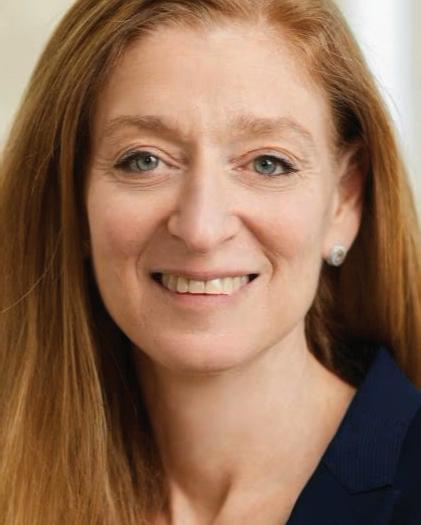
Melissa Lavinson is the executive director of Massachusetts’ recently established — and first in the nation — Executive Office of Energy Transformation. In this role she is charged with executing a community-by-community decarbonization strategy. Prior to this appointment, she served as the head of corporate affairs for National Grid in New England. Melissa will use her time on the TEDx stage to talk about the novel office she runs, and the challenges and opportunities involved in the complex efforts related to meeting the commonwealth’s decarbonization goals. These speakers, and all those who reached out interested in participating, have deeply inspired us. We are thrilled to welcome these nine amazing thought leaders to our TEDx Berkshires stage at the BIC to share their stories with our community. We hope you will join us live at the BIC on Oct. 10 and that you will help spread the videos once they are published.
For information about the BIC or TEDx, please visit berkshireinnovationcenter.com.
With industry shifts occurring nationwide in the real estate practice of hiring a buyers agent, impacts are affecting Berkshire real estate homebuyers as well: the introduction of mandatory written buyer agreements for all home-buying transactions.
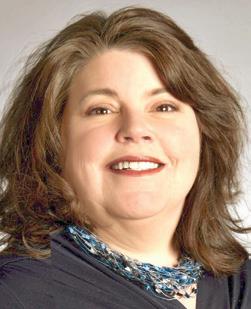
tionship between buyers and their Realtors, offering greater legal protection and reducing the risk of misunderstandings or disputes.
This new requirement will enhance transparency, accountability, and trust between Realtors and their clients, align our practices with national standards and provide clearer protections for homebuyers.
Effective Aug. 17, all buyers working with a Realtor in Massachusetts and throughout the U.S. will be required to enter into a written agreement that outlines the roles, responsibilities, and expectations of both parties throughout the home-buying process. This change is part of organization’s ongoing commitment to improving the real estate experience and ensuring that our clients are well-informed and fully protected.
WHY WRITTEN BUYER AGREEMENTS?
Clarity and transparency: Written agreements provide a clear understanding of the services to be provided by the Realtor, ensuring that buyers know what to expect at every stage of the transaction.
Enhanced protection: These agreements formalize the rela-
Professional accountability: By defining the Realtor’s duties and obligations in writing, buyers can have greater confidence in the professional standards and ethical practices upheld by their Realtor.
Informed decision-making: Buyers will be better equipped to make informed decisions with a clear outline of the Realtor’s role and the terms of their engagement, fostering a more collaborative and informed home-buying experience.
Nick Geranios, president of the Berkshire County Board of Realtors, shared “Introducing mandatory written buyer agreements is a proactive step towards enhancing the real estate experience in Massachusetts. This change requires Realtors to formally share what services they will provide throughout the home buying process and the compensation they will receive if navigating the buyer through a successful transaction. Our goal is to make the home-buying process as smooth, transparent, and enjoyable as possible.”
PROACTIVE STEPS
To ensure a seamless

transition, the Berkshire County Board of Realtors has launched an extensive education campaign for all members. We’ve worked extensively with legal council to update all of our agreements to reflect changes that are required by the National Association of Realtors as part of a class action lawsuit, settlement, and ongoing plans to ensure buyers will be afforded with a high-level of professionalism. One part of this is offering a very intensive accreditation program for Realtors to obtain
a designation solely in the representation of our clients. Realtors across the state will also receive additional training to help guide their clients through this new process effectively. We’ve also created pamphlets and information fact sheets to help consumers navigate their way through some of these changes.
The Board of Realtors is dedicated to promoting the highest standards of professionalism, ethics, and service in the real estate industry. With a membership of over
525 Realtors, we are committed to advocating for policies that benefit both consumers and professionals in the real estate market. For more information on the new written buyer agreement requirement or to find a qualified Realtor in your area, please visit berkshirerealtors.net or contact us at 413-442-8049.
Sandra J. Carroll is the chief executive officer of the Berkshire County Board of Realtors and the Berkshire County Multiple Listing Service.

ADAMS Dennis and Kelly Lynch sold property at 57 Highland Ave., Adams, to Karl A. Sims and Stephanie Jimenez, $303,500.
Berkshire Bank, trustee of the Francis S. Szpak Trust, sold property at 37-39 Grove St., Adams, to D&B Real Estate Ventures LLC, $130,000.
Karen J. Landry and Mark D. Asdikian, co-trustees of the Walter M. Asdikian Jr. Trust, sold property at 19 Grandview Terrace, Adams, to Sara L. Feith, $312,000. Leon Frieri sold property at 2 Meadow Lane, Adams, to Darren and Yvette Teale, $195,000.
William B. and Frances A. Riley sold property at 71 Park St., Adams, to Pennybags Properties LLC, $275,000.
Joseph B. and Ann Marie Doyle sold property at 1 Dean Drive and 92 West Road, Adams, to Colleen A. Doyle, $185,650.83.
Cheryl M., Peter T., David C., Carleen, and John Horn, Thomas H. Horn Jr., and Lisa Horn Fournier sold property at 0 Grove St., Adams, to James W. and Judith A. Carpenter, $21,000.
D&B Real Estate Ventures LLC sold property at 25 Temple St., Adams, to Chris and Linda Bonnivier, $195,000.
John P. and Deborah A. Calderara sold property at 41 Melrose St., Adams, to Andrew and Hannah Voorhis, $425,000.
Nathaniel W. Karns and Donna E. Cesan sold property at 4 Edmunds St., Unit M302, Adams, to Peter and Nuria Whiticar, trustees of the Peter and Nuria Whiticar Living Trust, $326,000. Adams Center for Art LLC sold property at 13 Commercial St., Adams, to Chi-Kuang Jiang, $60,000. Norah K. and Christopher L. Wood sold property at 27 Second St., Adams, to Joseph L. and Jeanene A. Testa, $260,000.
John P. Kozak II and Jacqueline F. Bianco sold property at 144 East Road, Adams, to Shannon D. and Julianne Sumner, $525,000.
Michael J. Casteel and Megan D. Buness sold property at 7 Hughes St., Adams, to Wayne G. Arnold, $81,000. Jacob E. Belanger sold property at 86 Lime St., Adams, to Zachary T. and Megan F. Hillard, $235,000. Howland Avenue Property Management LLC sold property at 65 Howland Ave., Adams, to Matthew and Alexandra L. Wright, co-trustees of the Wrightful Properties RVT, $274,900.
ALFORD
Cloud Kingdom 2020 LLC sold property at 258 East Road, Alford, to Two Mules LLC, $1,250,000.
BECKET
Aron Dana and Daniel Asa Rose, Cecily Rose-Itkoff, Renee Rose Shield, Graciela A. Sas-Rose, and Aron Dana Rose, Cecily Rose-Itkoff, trustees Anne Rose RT Agreement, sold property at 297 George Carter Road, Becket, to Laurent Bernard Abelin and Suzanne Ehlers, $400,000.
Bruce M. and Anne M. Walton sold property at 112 Trail Circle, Becket, to Nathan and Sarah Singer, $380,000. Crystal Miller sold property at Deer Run, Becket, to Mark J. Cerilli, $40,000.
Homebound Publications LLC sold property at Captain Whitney Road, Becket, to Mark Joseph Hermenze, $27,000.
Joanne Peppas sold property at 197 East Shore Road, Becket, to Kathryn L. Sandstrom, $40,000.
Ivan S. and Susan R. Rosenblum sold property at 687 Seneca Drive, Becket, to Stephen and Laura Monthie, $910,000.
CHESHIRE
Linda D. Brown, trustee of the 24-34 South Street NRT, sold property at 24-34 South St., Cheshire, to Stoney Brook Property Management LLC, $175,000. Diana L. Laframboise sold property at 67 Wilshire Drive, Cheshire, to SKI RE LLC, $245,000. Eric Whitney sold property at Ingalls Road, Cheshire, to Vincent R. and Megan D. Milano, $60,000. Marshal G. and Kathleen G. Harrington sold property at 329 Stewart White Road, Cheshire, to Christopher Degrenier, $80,000.
Alfred A. and Victoria T. Moulen sold property at 75 East Main St., Cheshire, to Nicholas Stephen and Allison May Lillie, $267,000. Rocket Mortgage LLC sold property at 57 Church St., Cheshire, to Next Level Real Estate Corp., $85,600. Jacob C. and Kellie Q. Keplinger sold property at 4 Devonshire Drive, Cheshire, to Ben A. and Suzette M. Scoble, $500,000.
CLARKSBURG
Wayne Bingle sold property at 63 Carson Ave., Unit 5, Clarksburg, to Samantha Tan, $116,000. Amanda L. Mazza sold property at 44 Wheeler Ave., Clarksburg, to Matthew C. Denno, $186,500. Danmark, LLC sold property at 25 Millard Ave., Clarksburg, to Ralph Morrison and Ksenia Ruuska, $297,000. Avery Woodbury sold property at 480 River Road, Clarksburg, to Alicia Anne Jalalian, $195,000. Audrey L. Matys and Karen A. Cyr sold property at Pine Avenue, Clarksburg, to Michael and Jennifer Lefevre, $75,000.
Michael D. Ryan, personal rep. of Gilbert Francis Ryan, sold property at 465 North Houghton St., Clarksburg, to Jacob A. Tietgens and Ryan C. Bannen, $174,000.
DALTON TEC Realty LLC sold property at 272 Hubbard Ave. Dalton, to Berniche Realty LLC, $600,000. Kevin K. Daniels, personal rep. of the Estate of William S. Daniels Jr., sold property at 58 Flansburg Ave., Dalton, to Marcio Joao Da Silva, $147,500.
Thomas G. and Valerie J. Conte-Mesquita sold property at 111 River Birch Lane, Dalton, to Hal M. and Mary L. Lewis, $790,000.
Kimberlee A. Simeone sold property at 301-303 East St., Dalton, to Victor P. Cowie, $256,000. Paul P. Briggs sold property at 471 Old Windsor
Road, Dalton, to Nathan White and Miranda Sawyer, $245,000.
Joseph L. and Jeanene A. Testa sold property at 120 Park Ave., Dalton, to Amanda Nefreres and Stacy Donovan, $245,000.
Brandon R. Noyes sold property at 56 Norwich Drive, Dalton, to Brett N. and Kellie A. Holsborg and Alan A. Nash, $279,000.
Robert J. and Carlene J. Arambula sold property at 73 Falls Brook Terrace, Dalton, to Barbara Burner, $129,900.
James A. Currie sold property at 180 Yvonne Drive, Dalton, to Sean Patrick and Melissa Dawn Hassett, $600,000.
Amy L. Lindquist sold property at 81 Riverview Drive, Dalton, to Liezl Grace Irisari and Katie Lee Morey, $332,000.
EGREMONT
Patrick Rayball and Barbara Rayball sold property at 92 & 96 Baldwin Hill N/S, Egremont, to James F. Wright and Emily W. Sartor, $755,000.
Ronald J. Ronan and Karin C. Watkins sold property at 7 Button Ball Lane, Egremont, to Britta Steilmann, $1,122,000.
Donald R. Pulfer and Ruth Blair sold property at 11 Hickory Hill Road, Egremont, to John L. Griffith and Julia A. Porter, trustees of Griffith-Porter Family Trust, $875,000.
Martha A. Beyer, trustee of Beyer Family Trust, sold property at 125 Jug End Road, Egremont, to Jug End LLC, $365,000.
FLORIDA
Heidi L. Pellerin, personal rep. of Kyle Pellerin, sold property at 29 South St., Florida, to Brent Wiencek, $42,000.
Douglas O. and Marianna Mason sold property at 72 Central Shaft Road, Florida, to Cody White, $380,000. Great Barrington
Jonathan Hankin, trustee of Jonathan Hankin 2023 Trust, sold property at 41 West Plain Road, Great Barrington, to Elizabeth J. McLaughlin and Kenneth A. Geremia, $675,000.
Brian S. Hazelton and Mariana Cicerchia sold property at 26 Avery Lane, Great Barrington, to Amalia Feld, $405,000.
Ronald P. Moriarty and Judith M. Moriarty sold property at 5 Pleasant View Drive, Great Barrington, to CMG Studio LLC, $668,000.
Lynne R. Vadnais and Ronald J. Auger sold property at 218 North Plain Road, Great Barrington, to Jeffrey Lawson and Susan Scott, $420,000.
Jeanne R. Chesanow, trustee of 28 Blue Hill Road Realty Trust, sold property at 28 Blue Hill Road, Great Barrington, to Alexandra Z. Papas, $275,000.
Gerald A. Denmark, trustee of Melvin J. Katsh 1992 Revocable Trust, sold property at 197 Main St., Great Barrington, to DGGB LLC, $1,350,000.
Nicole Page sold property at 77 Grove St., Great Barrington, to Laurel Katherine Nakadate and Hiram Frederick Moody III, $700,000.
CG Grace Properties LLC sold property at 30 Prospect St., Great Barrington, to Donald Samick, $821,500. Jay A. Magee sold property at 57 Castle St., Great Barrington, to Susan L. Magee and Robert V. Magee Jr. and Laurie A. Magee and Andrew J. Magee, $140,000. John Migliaccio and Ann Migliaccio sold property at 150 Hurlburt Road, Great Barrington, to James C. Penrose and Mary Buff Penrose, $660,000.
HANCOCK
Mary Sarah and Christy V. Thanas Jr. sold property at 37 Corey Road, Unit 824, Hancock, to Joseph da Cruz, $200,000.
HINSDALE
Alexander N. Hopkins, trustee, William Boyd Hopkins Testamentary Trust, sold property at 105 White Birch Lane, Hinsdale, to Warren Michael Mayer, $360,000. DETAR LLC sold property at 316 Longview Ave., Hinsdale, to Peter Nugent and Tierre Murphy, $264,900. Arthur L. and Anne M. Shurtleff sold property at 265 Bilodeau Brook Road, Hinsdale, to Karl and Paula Subklew, $480,000.
Paul K. Rhorer, trustee, Paula K. Rhorer RVT, and Allison R. Veneziano sold property at 265 Pine Cone Lane, Hinsdale, to Lucille and Steven D. London, $570,000. Pamela L. and John E. Scalzo Jr. sold property at 52 Goodrich St., Hinsdale, to Paul J. Lange, $252,500.
LANESBOROUGH
Avis Y. Larese sold property at 25 National St., Lanesborough, to Jacob Gelinas, $110,000. Mountain Stream LLC sold property at Miner Road, Lanesborough, to Joseph Alfonso, trustee of the Alfonso Family NT, $64,900. Leanne Ramsdell and Erika Hillian, co-personal reps. of Kenneth Charles Ramsdell, sold property at 20 Swamp Road, Lanesborough, to Edward Vella Jr., $275,000. Leo Curry sold property at 18 Rosenberg Road, Lanesborough, to Francois Martin, $85,000. Elizabeth A. Sperlonga sold property off North Main Street, Lanesborough, to Kara E. and Gordon E. Zaks, $25,641.
John A. and Jennifer M. Trivette sold property at 205 Bailey Road, Lanesborough, to Michael and Elise H. Ludwig, $488,000. Wing Lee and Jinny Chung sold property at Bailey Road, Lanesborough, to Michael Tatro and Jaclyn Candelet, $55,000. Mountain Stream LLC sold property at Miner Road, Lanesborough, to Leila Levy and John Pinegar, $55,000. Lindsey Kurowski sold property at 828 North Main St., Lanesborough, to Marie P. Quiroga and Benjamin Iriarte Giraldo, $464,000.
LEE
Jane E. and Marcia B. Slaminsky sold property at 283 Stockbridge Road, Lee, to Robert V. and Maryann S.
Newton, $45,000.
Pamela Starr and Greer Goldstein, trustees, Ellen L. Browne Living Trust, sold property at 880 East St., Lee, to Robert Wechsler and Judith Factor, $450,000.
Edmund P. and Ellen M. Kelly sold property at 15 Hartwood Road, Lee, to Kacie Armstrong, $375,000.
Athina Grigoropoulos sold property at 30 Housatonic St., Lee, to Nestor Perez and Sandra N. Sosa, $550,000.
William C. and Christine B. Davis, trustees, William and Christine Davis RVT, sold property at 295 Marble St., Lee, to Nancy B. and Paul F. Mazut, trustees, Nancy B. Mazut RVT of 2012, and Nancy B. and Paul F. Mazut, trustees, Paul F. Mazut RVT of 2012, $292,500.
Alan B. Wilcox and Lynn M. Bertelli sold property at 50 Margerie St., Lee, to Anne R. W. and John L. Nieland, $221,750.
Jason and Colleen Free sold property at 30 St. Mary’s Ave., Lee, to Cindy Ann Buck, $391,000.
Patrick Consolati, personal rep. of Estate of Michael J. Van Zandt, sold property at 103 Devon Road, Lee, to William Bartini, $7,000.
Adrienne R. Dougherty sold property at 145 Pine St., Lee, to Bobbie J. Arrillaga, $389,000.
Golden Hill Properties LLC sold property at 40 Erskine Drive, Lee, to Thomas S. and Ann B. Reed, $137,500.
Sam Cuttito Jr. sold property at 325 Laurel St., Lee, to Scott Lesoine, $250,000.
William Fisk sold property at 1610 Pleasant St., Lee, to Joseph Tracy and Sophie R. Shrum, $420,000.
William T. Carty sold property at Beaver Dam Road, Lee, to Jennifer M. and Maguire Roosa, $50,000.
William T. Carty sold property at Beaver Dam Road, Lee, to Jennifer M. and Hunter Roosa, $50,000.
J. Donovan & Son Inc. sold property at 1660 Cape St., Lee, to Chris Garrity LLC, $170,000.
Jeffrey Spratt and Courtney G. Stutz sold property at 65 Erskine Drive, Lee, to Nicholas W. Bruzzi and Gabrielle G. McNeice, $620,000.
LENOX
Joseph Sarcinella and Irene Wong sold property at 178 New Lenox Road, Lenox, to Sharon L. Alpert and Gwendolyn J. Adam, $535,000.
Arthur J. Blum sold property at 31 Pinecrest Drive, Lenox, to Jesse W. and Christopher M. Tyler, $675,000.
Christopher Tyler and Jesse Tyler sold property at 92 Hubbard St., Lenox, to Edward Andrew Walsh Michel and Marianella Alvarado-Michel, $578,000.
Allan M. and Linda R. Forman sold property at 35 Edgewood Drive, Lenox, to Barry and Alison Hurewitz, $875,000.
Ernest F. Jordan sold property at 26 Patterson Road, Lenox, to Jose Maria Garcia Samol and Guadalupe Gonzalez, $475,000.
Anthony R. Witman sold property at 524 Walker St., Lenox, to Yi-Lo Yu, $345,000.
James R. Hashim, trustee, June F. Hashim RVT dated Feb. 13, 2002, sold property at 36 Pittsfield Road, Lenox, to 249 Wahconah Place LLC, $200,000.
Kathleen C. Gallagher, trustee, Kathleen C. Gallagher 1999 RVT, sold property at 43 Sherwood Drive, Lenox, to Lee T. and Nicole M. Nagata, $674,900.
MONTEREY
Mark Ferraro and Patricia Ferraro sold property at 12 Sylvan Road, Monterey, to Dsquared Lakehouse LLC and Sea Lakehouse LLC, $970,000. Kevin Wolff sold property at Sandisfield Road, Monterey, to Emanuel C. Wolff, $25,000.
Daniel A. Andrus and Susan M. Lukas sold property at 335 Main Road, Monterey, to Joshua Carl Webb and Marguerite Borgny McRae, $415,000.
MOUNT WASHINGTON
Jacob Lewis and Katherine Cody Lewis sold property at West Street, Mount Washington, to S. Hyland, $1,000.
NEW MARLBOROUGH
Daniel J. Miller sold property at Sisson Hill Road, New Marlborough, to John E. Ormsbee, $90,000.
Scott S. Mackenzie and Kathleen Loring sold property at 415 Adsit Crosby Road, New Marlborough, to Olen S. Dick and Lauren D. Rosen, $450,000.
David Madow and Patricia L. Salzmann Madow sold property at Hartsville-New Marlborough Road, New Marlborough, to Judith W. Polisar, trustee of Judith W. Polisar Revocable Trust Agreement of 2016, $115,000.
Susan E. Pfeiffer sold property at 20 Aberdeen Lane, New Marlborough, to Jacob C. Keplinger and Kellie Q. Keplinger, $310,000.
NORTH ADAMS
Scott Robert and Emily Avidon sold property at 271 Notch Road, North Adams, to Matthew S. Lawrence and Megan J. Blanchard, $249,000.
Susan M. Wolk sold property at 18-20 Beacon St., North Adams, to Jerry and Elizabeth S. Arsenault, $122,000.
Stephanie Manteufel and Joe Parks Beasley Jr. sold property at 21-23 High St., Unit 4, North Adams, to Daniel J. Bergevin, $250,000.
Nicole B. Rand and Thomas E. Rand Jr. sold property at 1033 Massachusetts Ave., North Adams, to Nicole M. Carter, $256,705.
Brenda E. Iijima and Elka E. Uchman, co-trustees of the Erika A. Uchman RVT, sold property at 41 Biltmore Ave., North Adams, to Marshall A. Lapidus and Suzanne L. Gordon, trustees of the Marshall A. Lapidus Declaration of Trust, $350,000. Capitaland Property Revitalization LLC sold property at 30 Charles St. and Charles Street, North Adams, to Terence Quinn, $58,000.
Moss Home Solutions LLC sold property at 22 Marietta St., North Adams, to David Lemaire, $40,000.
Neal B. and Barbara J. Martin sold property at 36 Cady St., North Adams, to Kathy Harmon, $299,900.
Scott B. and Amy C. Strange sold property at 17 Tyler St., North Adams, to James Lowe, $47,173.
Steven E., Shaun D. Ralston and Jennifer King, trustees of the Elizabeth M. Ralston 2014 Irrevocable Trust, sold property at 154 Bonair Ave., North Adams, to John Tyler and Amy Lynn Stanwick, $358,000. North Adams Realty LLC sold property at 74 American Legion Drive, North Adams, to Brava Properties LLC, $1,000,000.
Alfredo Mark Parsons sold property at 324 East Main St., North Adams, to John M. Lewis and Melvin A.
Wilson, $230,000.
Zachary T. Hillard sold property at 30 Marietta St., North Adams, to Charles D. Najimy, $210,000. Matthew R. Farrar sold property at 8 Duggan St., North Adams, to Sanjana Kumar, $176,000.
Susan A. Galipeau sold property at 35 Willow Dell, North Adams, to Intersectional Assets LLC, $305,000. Clark E. and Linda S. Champagne sold property at 470 Union St., North Adams, to Nathan Champagne, $50,000.
OTIS
Theresa M. and Patrick D. Bologna, trustees, Theresa M. Bologna RT, sold property at 155 Lake Shore Drive, Otis, to Sara Miron and Laird Bloom, $825,000. Jeffrey and Deborah Long sold property at 14 Highland Way, Otis, to Joseph S. Sosnoff and Mareshia D. Donald, $524,900.
Leonard Sabia Jr. and Suzanne Sabia sold property at 131 D’Wolfe Drive, Otis, to Joseph C. and Laiduien Grace Fan, $705,500.
Avi Laub sold property at 2184 Monterey Road, Otis, to John and Jacqueline Sugrue, $395,000.
Cheryl S. Kokoszka sold property at 1154 East Otis Road, Otis, to Bret and Diane D. Calder, trustees, Pond View RET, $40,000.
Candice P. Craig Girouard sold property at East Otis Road, Otis, to Peter and Kathleen Stearns, $15,000. OTISFISH LLC sold property at 137 Rainbow Road, Otis, to Jason W. Fuller and Teresa Calendrillo-Fuller, $120,000.
PITTSFIELD
Delalba Holdings LLC sold property off Doreen Street, Pittsfield, to James F. and Sharon I. Gilmore, $2,500. Eukeria R. Asamoah and Joseph Dodoo sold property at 303 Connecticut Ave., Pittsfield, to April and Stacey Larabee, $290,000.
Matthew J. Chrzanowski sold property at 70 Ontario St., Pittsfield, to Robert Nicholas, $250,000. Taylor A. Bartlett sold property at 112 Elizabeth St., Pittsfield, to C&A Rentals Management LLC, $325,000.
Fredy Andres Bernal Bernal and Gladys Bernal Garcia sold property at 54-56 King St., Pittsfield, to Kai Lim, $290,000.
Veronica Green, Matthew and Phillip Bock, Samuel and Edward Tomashek sold property at 539 Elm St., Pittsfield, to Justin Amidon, $341,500.
Gabrielle Williams sold property at 69 Richmond Ave., Pittsfield, to Dominque Fox, $252,500.
Paul C. Ray, personal rep. of Estate of Helen M. Ray, sold property at 10 View St., Pittsfield, to Elliot J. Ray and Lauren H. Phillips, $97,500. Albindian Realty LLC sold property at 5 Crane Ave., Pittsfield, to Nixon D. St. Bernard, $279,900. Steven J. and Mary B. Fruchterman sold property at 131 Gamwell Ave., Pittsfield, to Michael David Parks, $350,000.
Christian G. and Tamara B. Whitney sold property at Old Farm Lane, Pittsfield, to Sam Pogosov, $50,000. Wintrust Mortgage, Barrington Bank & Trust Company N.A. and Kenneth R. Flanders Jr. sold property at 70 Lebanon Ave., Pittsfield, to TMR Realty LLC, $191,000. Rocket Mortgage LLC and Scott Baker sold property at 23 Elberon Ave., Pittsfield, to TMR Realty LLC, $255,000.
David P. and Donna L. Edwards sold property at 157 Cheshire Road, Pittsfield, to Ellies Holdings LLC, $180,000.
Melinda S. Pierce, personal rep. of Estate of Robert F. Smith Sr., sold property at 48 Seymour St., Pittsfield, to Sarah Lynn Miles and Robert T. Lowell III, $172,500. Susan M. Beucler sold property at 45 Bel Air Ave., Pittsfield, to Stefanie L. Weber and John T. E. Gault, $6,000.
Edward J. LaDouceur Jr. and Constance A. LaDouceur sold property at 492 Peck’s Road, Pittsfield, to Sava Svirskiy, trustee, St. Petersburg Nominee RT, $270,000.
Claudio N. and Jhonny F. Siguencia sold property at 25-27 Hamlin St., Pittsfield, to Cristobal Esteban Monsalve, $296,000.
Margaret M. O’Brien sold property at 41 William St., Pittsfield, to Joan M. Wilkinson and Christine A. Bailey, $386,100.
HSBC Bank USA, NA, trustee, and Christian H. Behn Jr. and Sandra Lee Behne sold property at Woodstream Drive, Pittsfield, to B.K.E Services LLC, $162,000. Richard D. Sands sold property at 262 Dawes Ave., Pittsfield, to Jessica Rufo, $370,000.
Morgan T. Williams sold property at 88 Hungerford St., Pittsfield, to Jessica M. Perrault, $275,000.
Jessica Duplin sold property at 585 Elm St., Pittsfield, to Zaw Zaw Aung and Thet Htar OO, $322,000.
Naomi Cortez sold property at 79-81 Greylock Terrace, Pittsfield, to Diana Rocio Ortega Pabon, $250,000.
Melissa A. Groat sold property at 48 New Road, Pittsfield, to Lynn M. Osaki, $189,000.
Jane L. Lawless sold property at 86 Commonwealth Ave., Pittsfield, to Brittany Simola and Robert R. Noto, $314,000.
Mary DiNicola sold property at 31 Brown St., Pittsfield, to Hurricane Properties LLC, $245,000. Katarzyna H. Frankfurter and Raul P. Saldana sold property at 100 Boylston St. Extension, Pittsfield, to Taylor Bartlett, $137,500.
U.S. Bank Trust NA, trustee, sold property at 56 Weller Ave., Pittsfield, to LND Investments LLC, $155,925. U.S. Bank Trust NA, trustee, sold property at 18-20 Elizabeth St., Pittsfield, to LND Investments LLC, $191,000.
Kathleen A. Fahey sold property at Pondview Drive, Pittsfield, to Amber J. Ubertini, $234,900. Jo Ann Sinopoli, trustee, Jo Ann Sinopoli RVT, sold property at 4 Green St., Pittsfield, to Bryan and Sandra Vanlingen, $252,000.
Bruce R. and Linda L. McLeod sold property at 22 Anita Drive, Pittsfield, to Mark H. Van Horn, $336,000. Christopher J. and Kristina M. Percey sold property at 367 Elm St., Pittsfield, to Brian M. Begley, $180,000. Cheryle M. Veit, Donna S. Sadighi, Glenn N. Dugan, and Laurie R. Dugan-Macchi sold property at 80 Rose Terrace, Pittsfield, to Amir H. Sadighi, $342,000.
Trinity Ventures LLC sold property at 261 Highland Ave., Pittsfield, to Vincente and Patty A. Rodriguez, $270,000.
TCI Holdings LLC sold property at 75 Atwood Ave., Pittsfield, to Nicole Pantelidis and Despina Mendelsohn, $260,000.
Thomas A. Faulkner sold property at 187 Lakeway Drive, Pittsfield, to Andres Ignacio Perez Coral and Balbina Laura Carbrera Sanchez, $250,000.
Daniel J. Jones and Christine A. McDonald sold property at 56 Unkamet Park Drive, Pittsfield, to Ngowari Jaja, $370,000.
Nancy M. Brindley, trustee, Nancy M. Brindley Revocable Living Trust, sold property at 1 Colt Road, Pittsfield, to Andrea Leigh, $278,500.
Robert Lincourt sold property at 19-21 Livingston Ave., Pittsfield, to Kathleen A. Jackson, $350,000.
Jennifer L. Marshall and Kimberly A. Winters, trustees, LJM RT, sold property at 207-209 Pomeroy Ave., Pittsfield, to Sonia Ayde Pacheco Ramirez and Mabelin Tatiana Plazas Pacheco, $325,000.
John F. Kane sold property at 15 Unkamet Park Drive, Pittsfield, to Francis and Margaret Biagini, $370,000. Woodland Excavation Corp. sold property at 139 Deming St., Deming Street and Caledonia Street, Pittsfield, to 51 Pembroke LLC, $250,000.
Christopher M. and Jaclyn Smith Battaini sold property at 21 May Terrace, Pittsfield, to Jarret C. Hernandez, $280,000.
Gerard J. and Barbara J. Stringer, trustees, Gerard J. Stringer RVT and Barbara J. Stringer RVT, sold property at 196 Velma Ave., Pittsfield, to Bryan C. and Johana Machado Murphy, $416,000.
Joseph A. Pires Jr. sold property at 64 Holmes Road, Pittsfield, to Daniel Brian Broderick and Josie Marie Lavalley, $253,842.
MaryEllen Tanner Vincent sold property at 81 Dartmouth St., Pittsfield, to Malila Siv, $140,000.
Beverly Phillips sold property at 16 Taconic Park Drive, Pittsfield, to Ronald Ouimet, $75,000.
Elizabeth M. Calebaugh sold property at 359 Springside Ave., Pittsfield, to Elizabeth A. and Christine M. Harlow-Harris, $345,000.
Jason M. Casey sold property at 222
Springside Ave., Pittsfield, to ROYTAY LLC, $130,000.
Jhon Prey Hernandez Melchor and Nancy Eucaris Gomez Ramirez sold property at 33-35 Root Place, Pittsfield, to Edwin Riano Salcedo and Sandra Rodriguez Aponte, $190,000.
Christopher James Wagner and Katherine Maeve Wyman sold property at 35 Roberta Road, Pittsfield, to Timothy M. Murphy and Lauren C. Miller, $415,000.
U.S. Bank Trust NA, trustee, sold property at 102-104 Robbins Ave., Pittsfield, to POWERSREI LLC, $165,375.
Lee T. and Nicole M. Nagata sold property at 27 Meadow Ridge Drive, Pittsfield, to RAAJIPO Inc., $760,000.
James J. Massery, Michael P. Massery and Michelle R. Manion, trustees, Phillip E. Massery Family Irrevocable Trust, sold property at 10 Lyman St., Pittsfield, to BHD 10 Pittsfield Realty LLC, $950,000.
Robert A. McCabe sold property at 6062 Pine St., Pittsfield, to Devon Amaro, $240,000.
Peter J. Langlais, personal rep. of the Estate of Raymond T. Langlais, sold property at 53 Cambridge Ave., Pittsfield, to Nicholas D. Sereda and Claire L. Everhart, $350,000.
Milton Lestz and Neil Irick sold property at 71 South Church St., Pittsfield, to John and Laurie Griffin, $380,000.
Delalba Holdings LLC sold property at Barker Road, Pittsfield, to Robert J. Galvagni and Huyen Thanh N. Nguyen, $30,000.
Lorraine V.C. Samuelson sold property at 815 East New Lenox Road, Pittsfield, to BHO Realty LLC, $215,000.
Sean R. Winston and Kayla M. Lekov sold property at 51 Leona Drive, Pittsfield, to Luis Felipe Perez and Elizabeth Galarza-Perez, $400,000.
Joanne L. Heaton sold property at 174 Dan Casey Memorial Drive, Pittsfield, to John C. McDermott, $590,000.
Kent Lemme sold property at 13 Clarendon St., Pittsfield, to Hunter Phair, $315,000.
Craig V. and Patricia A. Cusson sold property at 11 Cherry Hill Drive, Pittsfield, to David A. and Janet R. Aitoro, $585,000.
Peter E. Putnam sold property at 4 Pinehurst Ave., Pittsfield, to Nancy Jocelyn Hall, $349,900.
Michael McNeil sold property at 39 Quirico Drive, Pittsfield, to James E. Widdis Jr. and Mary E. Widdis, $387,000.
CIM REO 2021-NR1 LLC sold property at 328 First St., Pittsfield, to Michael Jordan
Sr., $100,250.
RICHMOND
Lydia K. Lake sold property at 19 Anthony Road, Richmond, to Michael and Bonnie Brown, $485,000.
Nancy W. Sklar, trustee, Revocable Indenture of Trust of Nancy W. Sklar, sold property at 293 Stevens Glen Road, Richmond, to Joseph C. and Paula L. McNay, $3,750,000.
SANDISFIELD
Jeffrey Long and Deborah Long sold property at 14 Highland Way, Sandisfield, to Joseph S. Sosnoff and Mareshia D. Donald, $524,900.
Joanna K. Gulik sold property at 11 River Road, Sandisfield, to Fernando Lucas and Maria Soriano, $296,000.
Estate of William Henry Cohn sold property at 21 South Sandisfield Road, Sandisfield, to Hannah King, $544,000.
Chris Cotsapas sold property at 0 South Sandisfield Road, Sandisfield, to South Sandisfield Road LLC, $200,000.
Mark W. Bennett and Rita A. Bennett sold property at 23 West Hubbard Road, Sandisfield, to Jon J. Scapin, Stacy A. Horomanski and Michael J. Scapin, $65,000.
Brenna Mack sold property at Town Hill Road, Sandisfield, to Timothy Ayers and Rene Ayers, $25,000.
SAVOY
Kevin M. and Marcie A. Jones sold property at 0 Main Road, Savoy, to Ian A. and Sharyn McWilliams, $50,000.
SHEFFIELD
Jacob William Race sold property at 440 Polikoff Road, Sheffield, to Matthew Robert Turner, $102,500.
Peter A. Schneyer Jr. sold property at 647 Silver St., Sheffield, to Charles Gifford Cohen, trustee of Helia Smile Real Estate Nominee Trust, $695,000.
Jesse S. Rosenthal sold property at 12 Dogwood St., Sheffield, to Margaret Bradley Davis, $7,500.
Ricky J. Bassett sold property at 285 Salisbury Road, Sheffield, to Jeffrey H. Wachsstock and Lori S. Wachsstock, $486,000.
Brandon Robert Hunter-Haydon and Daisy Joan Hunter-Haydon sold property at 42 Valley View Road, Sheffield, to Susan G. Segall, $1,300,000.
Lucie Ethel Curtiss sold property at 0 Guilder Hollow Road, Sheffield, to Catherine C. Burns and Paul D. Burns, $250,000.
Paul A. Buckner and Tanya A. Buckner sold



property at 452 Shunpike Road, Sheffield, to Elizabeth Leighton Clarkson and Michael Kent Clarkson, $1,540,000.
Paul W. Gilligan, trustee of Janet P. Gilligan Living Trust, sold property at 49 Bow Wow Road, Sheffield, to Edward Burrous O’Malley and Mary Burrous O’Malley, $1,120,000.
Barry Neil Kaufman, trustee of Barry Neil Kaufman Living Trust dated July 17, 1998, and Susan Marie Kaufman, trustee of Susan Marie Kaufman Living Trust dated July 17, 1998, sold property at 2080 Undermountain Road, Sheffield, to Olifi Properties LLC, $3,401,530.
Option Institute & Fellowship sold property at County Road, Sheffield, to Olifi Properties LLC, $1,016,500.
STOCKBRIDGE
Frank A. Sessa sold property at 20 Lake Drive, Stockbridge, to Robert and Dawn Lazarus-Wolpov, $1,149,000.
Maureen F. McLaughlin sold property at 23 Church St., Stockbridge, to Hayley Shinerock, $495,000.
Dmitry Yakimchuk sold property at 14 Wheatley Drive, Stockbridge, to Theodore J. Stephens III, $118,693.
Mimi S. Fix, trustee, Fix RT, sold property at 3 Yale Court, Stockbridge, to Arthur Paul and Anne Therese Gennari, $655,000. Andrew and Nicole Spicehandler sold property at 47 Main St., Stockbridge, to David Roemer and Rachel Kramer, $1,275,000.
TYRINGHAM
Bo Youp Hwang, trustee, Bo Youp Hwang Trust of April 10, 2017, and Hai Ok Hwang, trustee, Hai Ok Hwang Trust of April 10, 2017, sold property at 29 Lakeside Drive, Tyringham, to David A. Berg and Elizabeth A. Layne, trustees of Berg/Layne FT, $701,000.
MBA Real Estate LLC sold property at Tyringham Road, Tyringham, to Laura Winner, trustee Thomas H. Winner Jr. Irrevocable Trust, $1,300,000.
WASHINGTON
Eli Real Estate LLC sold property at Beach Road, Washington, to Pugzee’s Farm LLC, $125,000.
Marion H. Rutledge sold property at Lovers Lane Road, Washington, to Cactus Renovations LLC, $75,000.
Danielle Y. Oliver and Danielle Y. Oliver, personal rep. of the Estate of Frederick Michael Oliver, sold property at 365 South Washington State Road, Washington, to David M. Monterosso and Holly J. Moran, $210,000.
Frances Premerlani and John C. Korte, trustees of Korte Family Realty Trust, sold property at 15 Albany Road, West Stockbridge, to Edward Harold Armstrong and Rachael Beth Armstrong, $340,000.
Boston Symphony Orchestra Inc. sold property at 20 & 21 Birch Hill Road, West Stockbridge, to Adriana G. Rojas, $1,450,000.
WILLIAMSTOWN
Robert A. and Samantha A. Livingstone sold property at 465 Pine Cobble Road, Williamstown, to Kathryn Ming Hart and Jacob K. Chu, $635,000.
Vipulkumar V. and Niketa Patel sold property at 45 North St., Williamstown, to President and Trustees of Williams College, $1,800,000.
Chi Zhang and Honghui Qiu sold property at 389 Henderson Road, Williamstown, to Bancroft 389H LLC, $1,046,000.
Kevin L. and Diane M. Hallenbeck, trustees of the Kevin L. Hallenbeck RVT of 2005, sold property at 35 McCauley Lane, Williamstown, to Thomas S. Richey and Elizabeth L. Fischer, $405,000.
Peter Alexander and Trienah Anne Meyers sold property at 600 Bee Hill Road, Williamstown, to Catherine A. Moore and Todd R. Fernandez, $1,700,000.
Richard P. Orell, personal rep. of Paul N. Orell and Joyce E. Orell, sold property at 18 Danforth St., Williamstown, to Kathleen Cunningham, $249,000.
Beechacre 3 LLC sold property at 73 Candlewood Drive, Williamstown, to Grace Kim and Alejandro Mones, $585,000.
WINDSOR
George A. Perreault sold property at 0 East Windsor Road, Windsor, to Sean Leroy and Rosa-Lee Louise Parker, $49,900. Paul E. and Jane M. Tetreault sold property at 1555 Windsor Bush Road, Windsor, to Steven H. Scamman, $81,000.
The real estate transactions are provided by the Middle Berkshire, North Berkshire and South Berkshire Registry of Deeds offices.

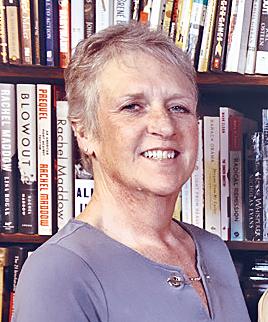
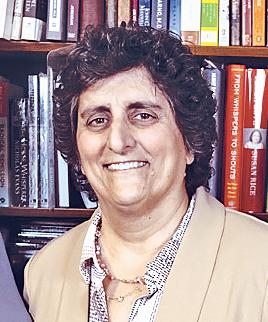
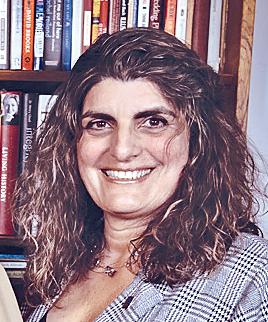

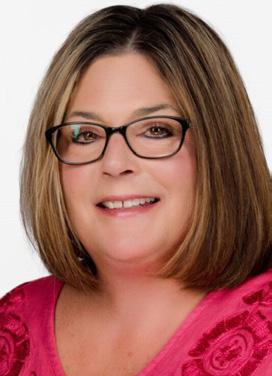
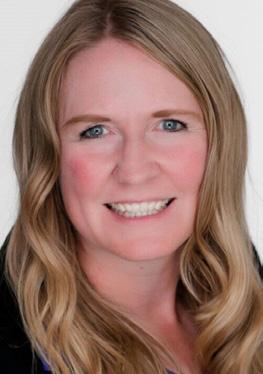
Lee Bank has announced two key promotions as part of its comprehensive initiative to reimagine its Consumer Banking Division.
Michelle “Shelly” Bombardier has been promoted to the position of Lee branch manager. With a combined 17 years of experience at Lee Bank, she brings an understanding of customers’ needs, a strong local connection and an ability to anticipate and problem solve.
Bombardier’s promotion follows the retirement of Lorita Trombly, who dedicated 11 years to managing the Lee branch of Lee Bank and over 40 years in the banking industry.
Alison Brigham has been promoted to vice president of Brand Experience and Community Impact. In her seven years at Lee Bank, Brigham’s work has helped the bank embody its core values. As the bank enhances its processes and delivery channels, she will ensure the bank remains true to its roots and the brand.
Brigham’s role also involves showcasing the bank’s community impact through the Lee Bank Foundation’s contributions, which provide funding to the local non-profit ecosystem.
Established in 1852, Lee Bank has branch offices in Lee, Stockbridge, Great Barrington, Pittsfield, and Lenox.

The Berkshire Family YMCA has named Taverick “Tank” Roberson as its new program coordinator. Roberson, a former three sport St. Joseph’s High School standout and 1,800-point collegiate basketball scorer, intends to bring the programing at the BFYMCA to an even higher level.
Roberson stated in his acceptance, “At the YMCA, we have a unique opportunity to create a nurturing and empowering environment. We can provide our youth and adults with the tools, support, and encouragement they need to grow, both as individuals and as members of our community.”
BFYMCA CEO Christian Bianchi, who has known Roberson since he was a child, said, “He’s always had a childlike spirit and energy about him that will benefit him in his role as program coordinator. We look forward to the work he’ll do in youth programming and adult fitness. We are fortunate to have him and look forward to seeing him grow in his role.”
The addition of Roberson will open new opportunities to further the programs at the Berkshire Family YMCA. Not only will Roberson work on the basketball programs, but he will also be committed to the betterment of all youth sports in Pittsfield. He will be working on creating group exercise programs and work to improve adult fitness in the community.

The Berkshire Museum has appointed Julia Marko as chief finance officer. A resident of Berkshire County, Marko brings a wealth of experience, having most recently served as the director of Finance and Operations at BART Charter Public School in Adams since July 2020. Prior to that, she served as BART’s business manager from January 2017 to July 2020, and worked for several years in the business office of the Pittsfield Public Schools.
Marko joins the senior leadership
team at Berkshire Museum during a pivotal time in its history as the museum prepares for a major renovation project later this year. Her extensive background in managing financial operations and strategic planning will be invaluable as the museum embarks on this transformation.
Marko’s role will involve leading and managing the museum’s finance and operations functions, including financial accounting, internal controls, facility operations, guest services, the gift shop, human resources, information technology and overall operations.
Her commitment to the museum’s goals as an inclusive, accessible and diverse institution will be vital in fostering a successful and equitable organization.

Tableaux Wealth, a registered investment adviser offering financial planning and investment management, announces the addition of Luke Delorme to its team of financial professionals.
Delorme, named director of financial planning, holds certified financial planner and chartered financial consultant designations.
Delorme joins Tableaux Wealth after serving as director of financial planning at a Great Barrington-based registered investment adviser. He has a bachelor of science in economics and an MBA from Boston College, where he received the Wall Street Journal award for the top finance student.
For information about Tableaux Wealth or to schedule a consultation, visit tableauxwealth.com, or call 413264-2400.
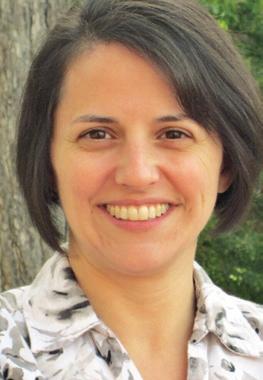

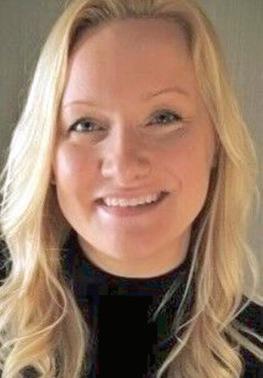

Berkshire Community College has announced the addition of four staff members, two promotions and a title change.
The new staff members include Lori DuBois as EDP system analyst III — LMS administrator in the Division of Teaching and Learning Innovation; Michelle Mellace as Administration and Finance Division manager; Jessica “Jess” Pemble as administrative assistant II for Workforce Development and Community Education; and Thomas Weeks as network/systems administrator.
At BCC, DuBois will be managing the learning management system and supporting faculty in their use of instructional technologies. DuBois was most recently a customer support specialist and trainer for the ed-tech company Springshare. Previously, she was a reference librarian and instruction coordinator at Williams College.
Mellace brings over 20 years of experience in contract management and 18 years in public purchasing. Most recently, she served as the Money School coordinator at the Elizabeth Freeman Center, where she coordinated their financial independence program and provided comprehensive support to participants. Previously, she was program manager at General Dynamics Mission Systems and chief procurement officer for the city of Pittsfield.
Pemble was most recently senior administrative assistant for Charter
Communications/Spectrum’s Western Massachusetts and Eastern New York technical operations management teams. Pemble brings over 18 years of experience in office administration, management support, data analysis, and events coordination. She resides in Dalton.
Weeks brings extensive expertise in information technology, encompassing servers, switches, applications, and cybersecurity. Before joining BCC, Weeks was the IT manager at Berkshire Sterile Manufacturing. Previously, he was the associate director of IT at a performing arts theater in New York City. He resides in Pittsfield.
Kelsey Breault has been promoted to director of payroll and budget management. She was previously payroll manager, a position she held since joining BCC in April 2024.
Tom Warner, who has been with BCC since July 2012, has been promoted to senior network and data warehouse administrator. He was previously network and systems administrator.
Abby Powers now has the title of interim student engagement and communications specialist. Her previous title was administrative assistant of student engagement, a position she held since April 2021.
The board of directors of Big Y Foods has appointed Megan L. Moriarty as director of meat and seafood for the entire Big Y supermarket chain. She succeeds Norm E. Vernadakis, who retired Aug. 1 after 39 years of leadership in the meat and seafood industry. Moriarty started her career with Big Y in 2015 as a store director. In 2017 she became floral sales manager and then seafood sales manager. In addition, she participated in the Big Y’s Women L.E.A.D. program, an employee resource group focused on personal and professional development.
Prior to her tenure at Big Y, Moriarty worked in retail operations for over 20 years and attended Penn State College. In 2020 she was named Top Women in Grocery by Progressive Grocer and in 2021 was the recipient of the Food Retail Leader Certificate from The Food Industry Association. She lives in Westfield.
Vernadakis started his Big Y journey in 1985 as a meat cutter and has held many positions such as meat and seafood manager, merchandiser/trainer and director of deli, bakery & kitchen. His contributions helped to build the Big Y’s new fresh foods strategy.
Based in Springfield, Big Y operates Berkshire County markets in Great Barrington, Lee, North Adams and Pittsfield and gasoline/convenience store locations in Lee and Pittsfield.






